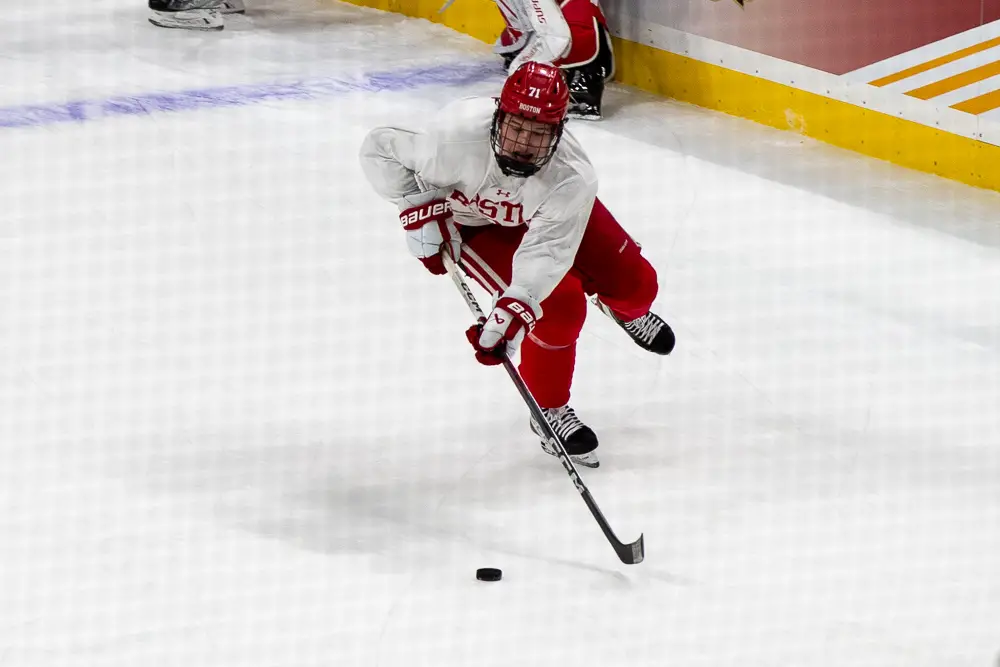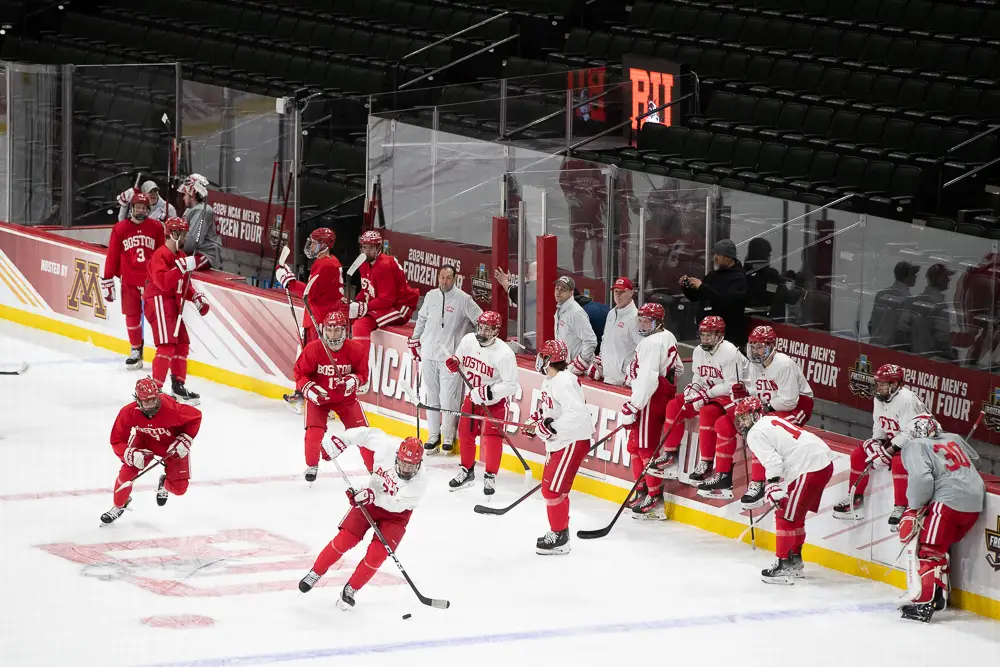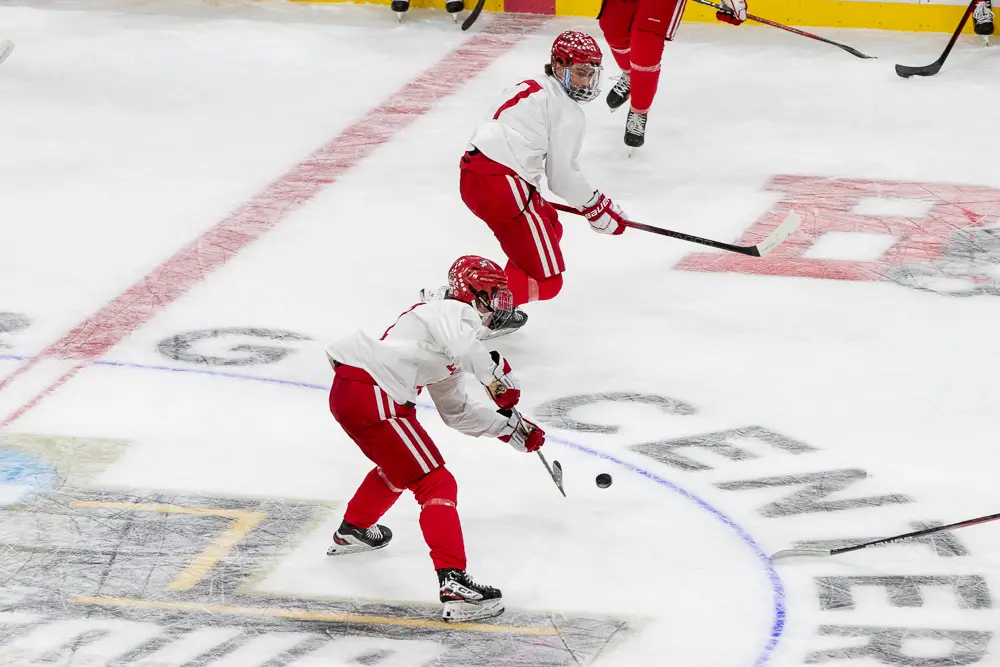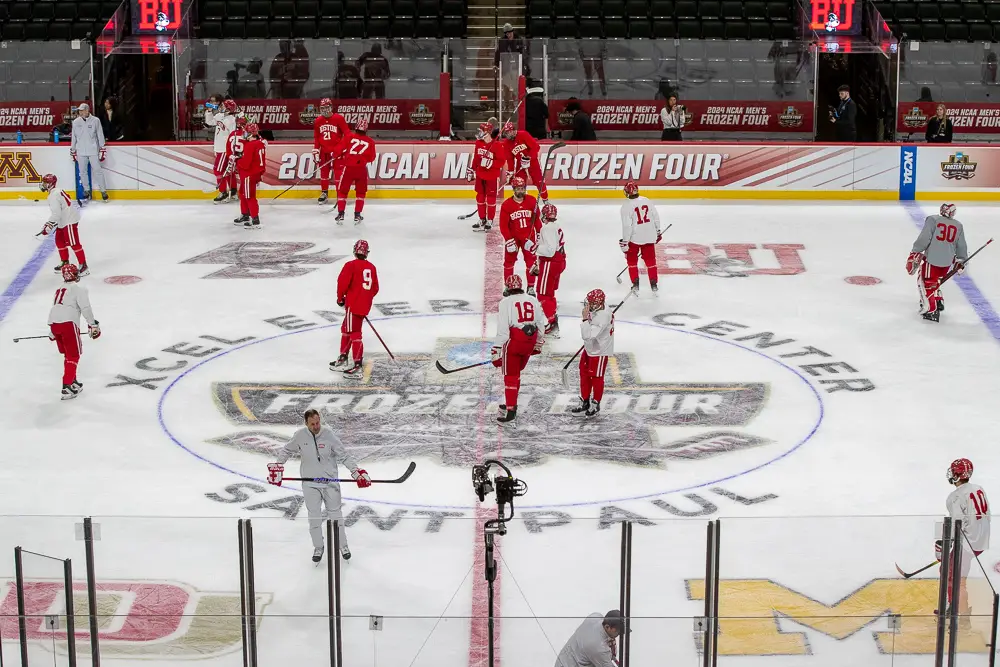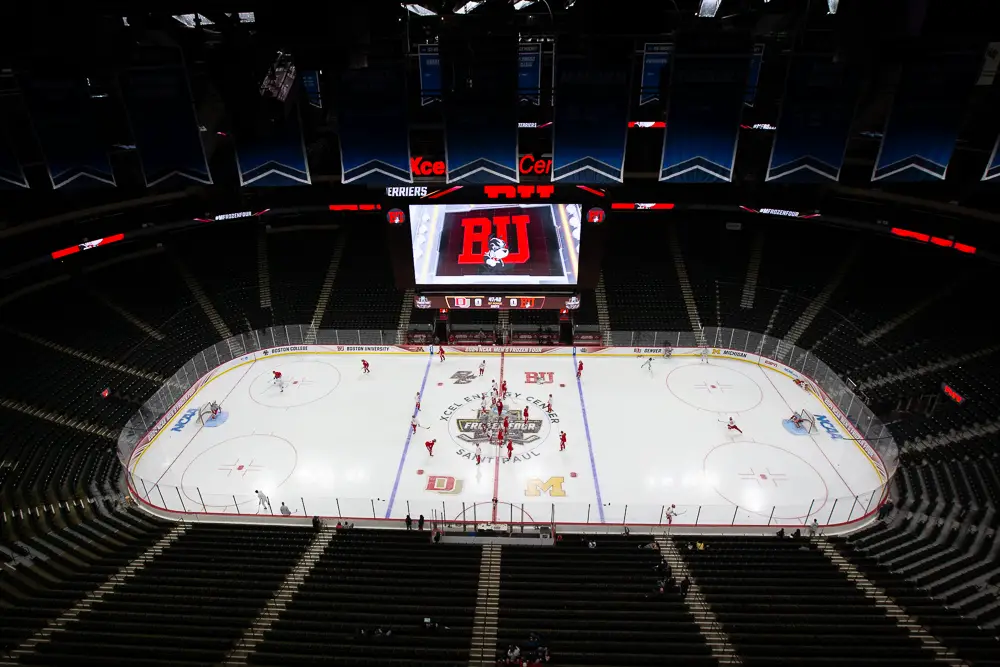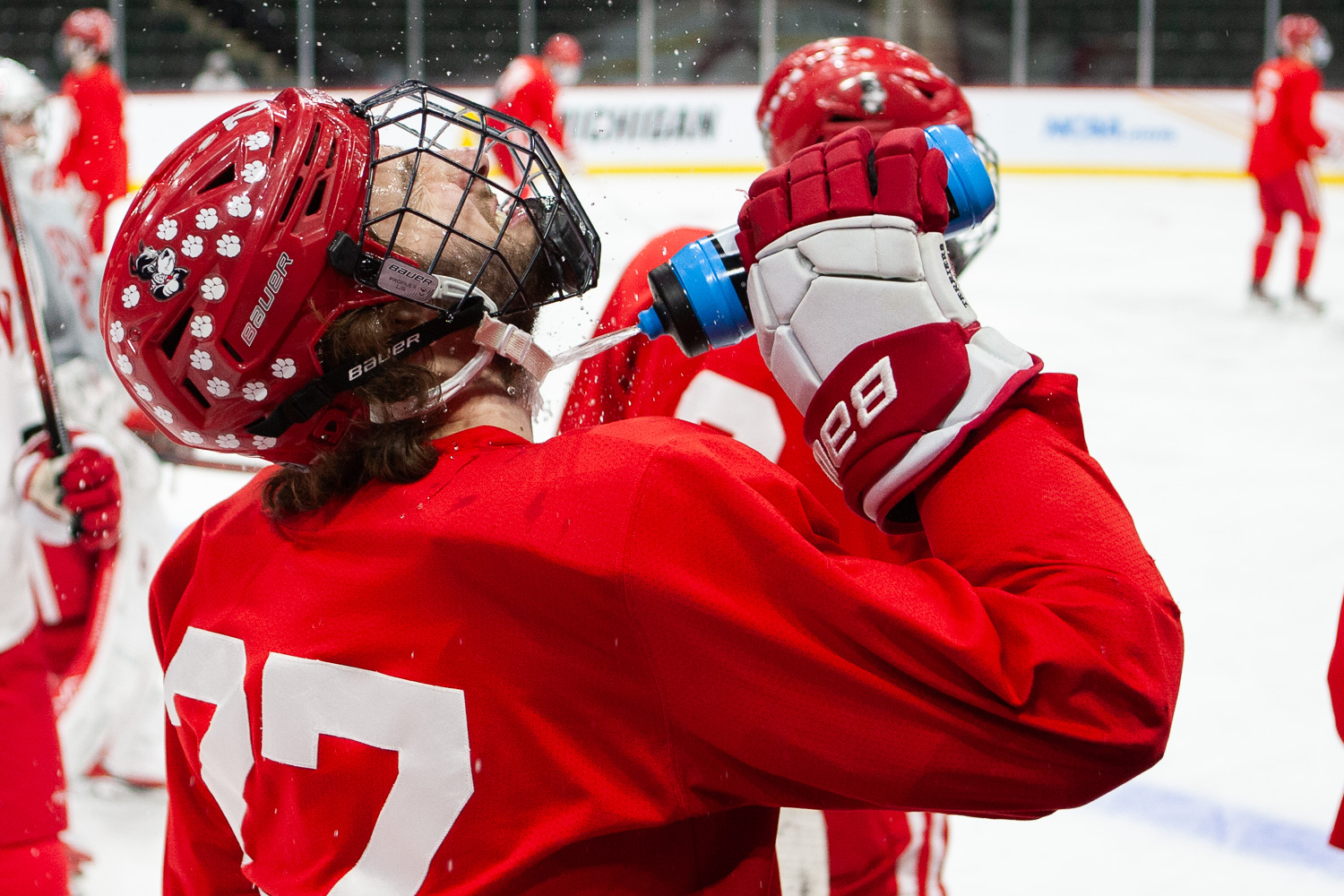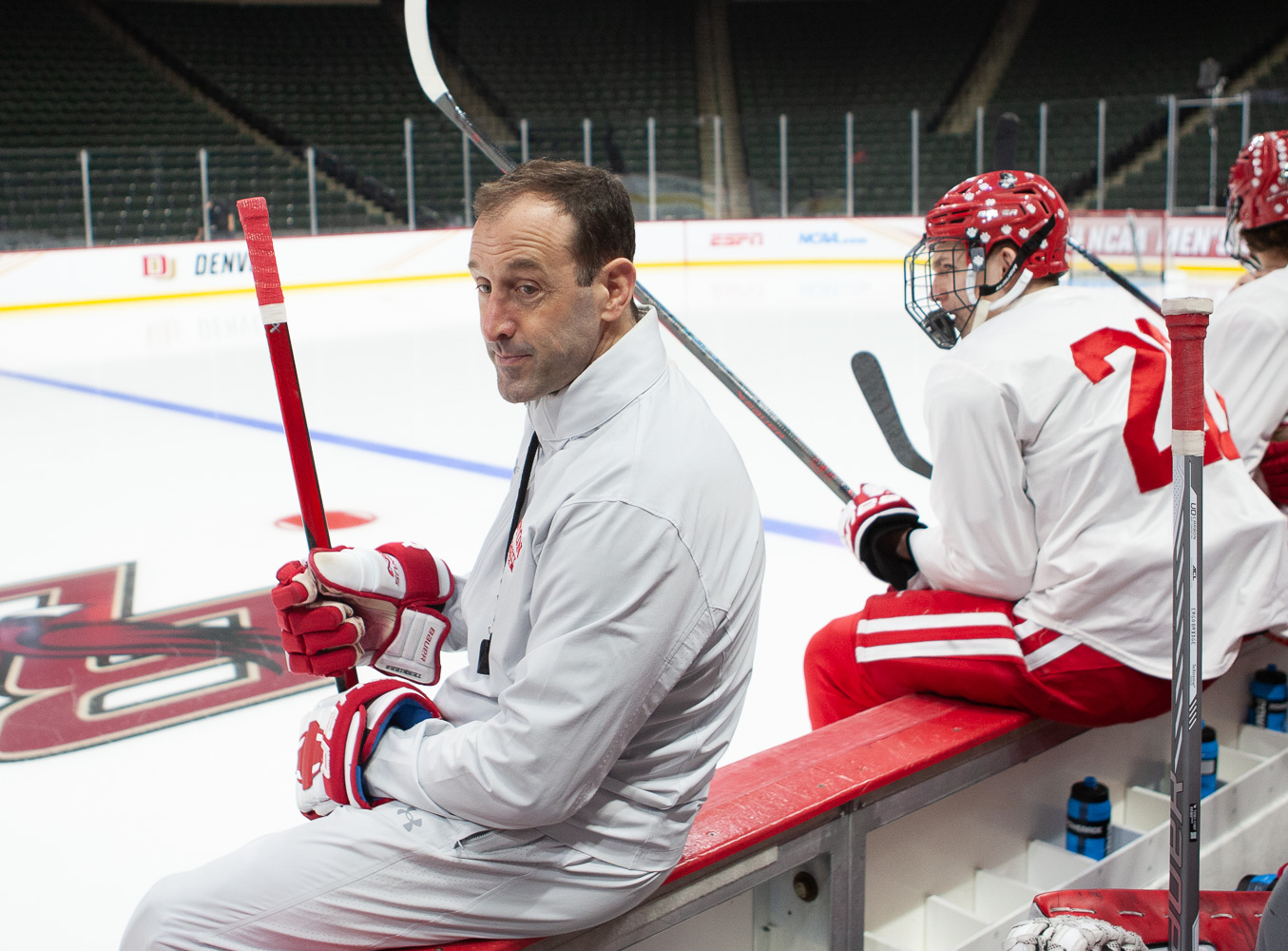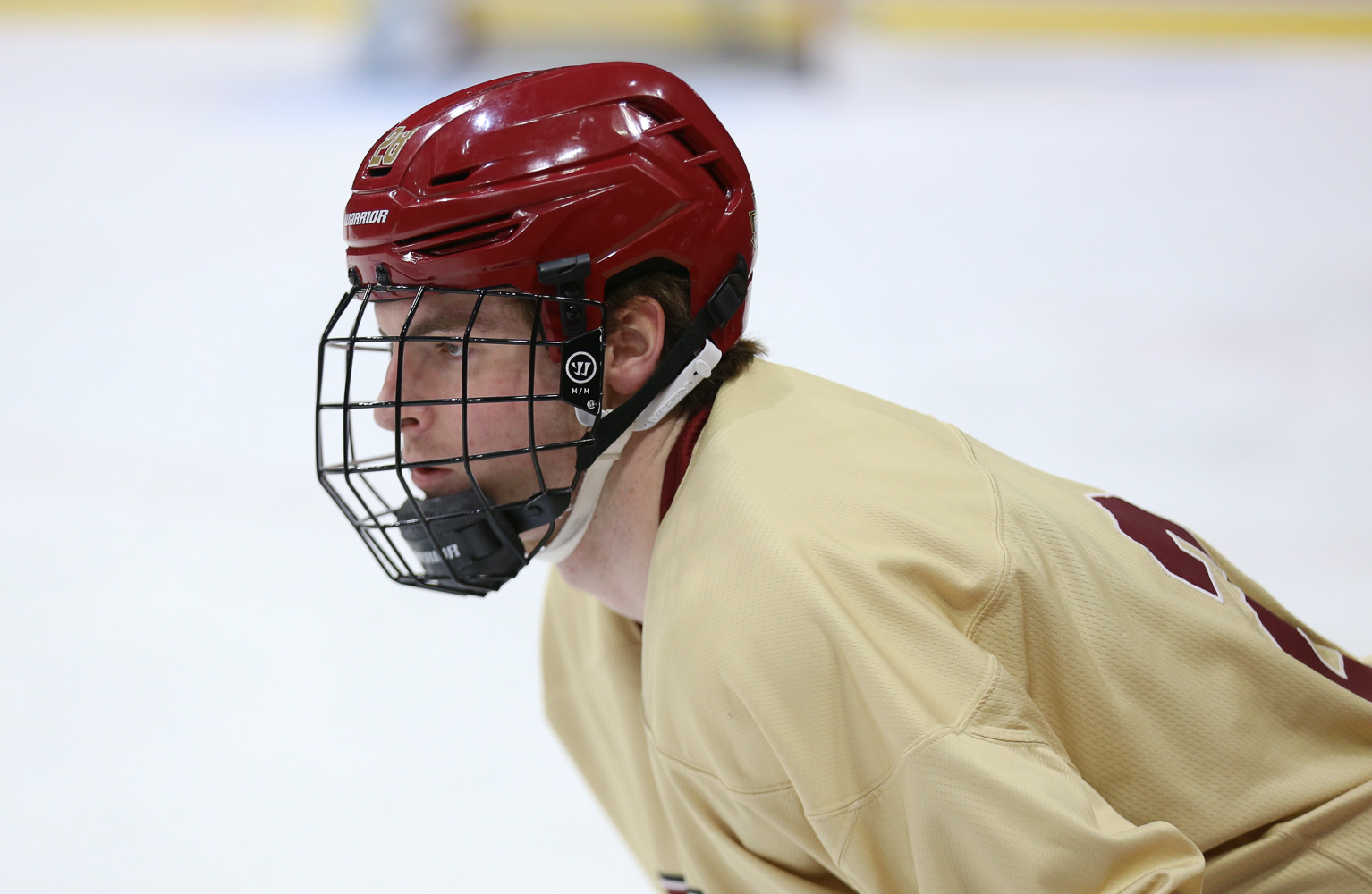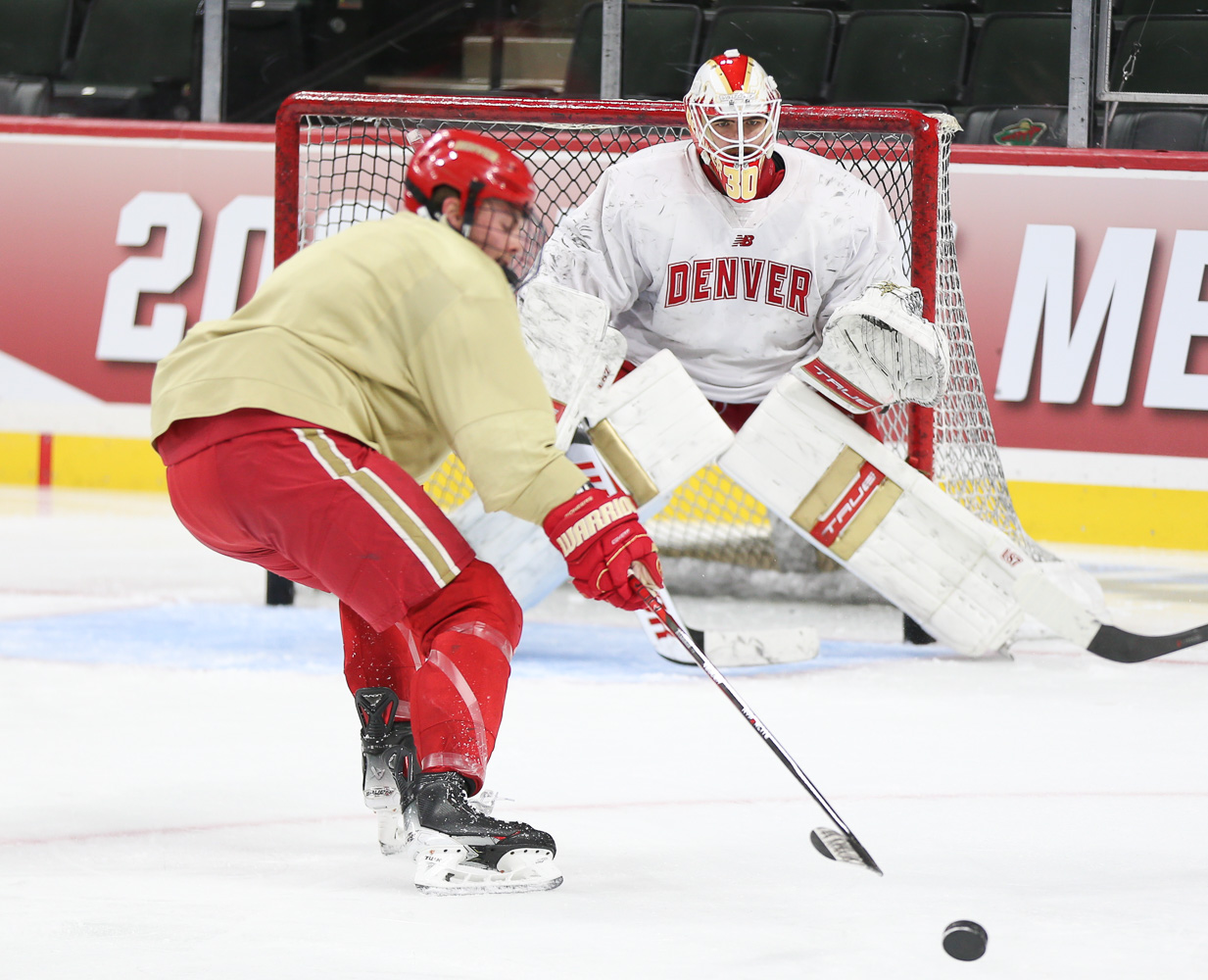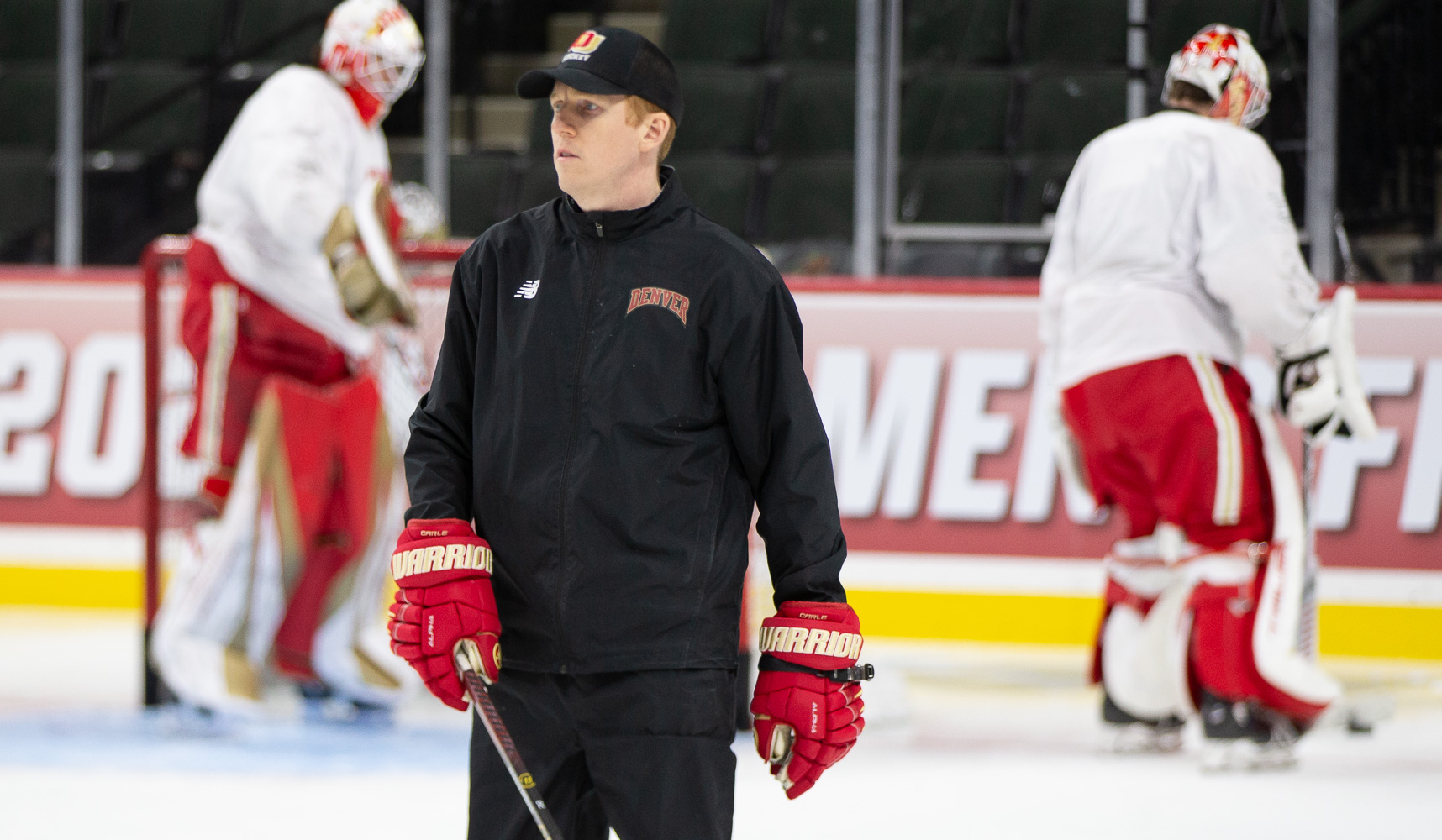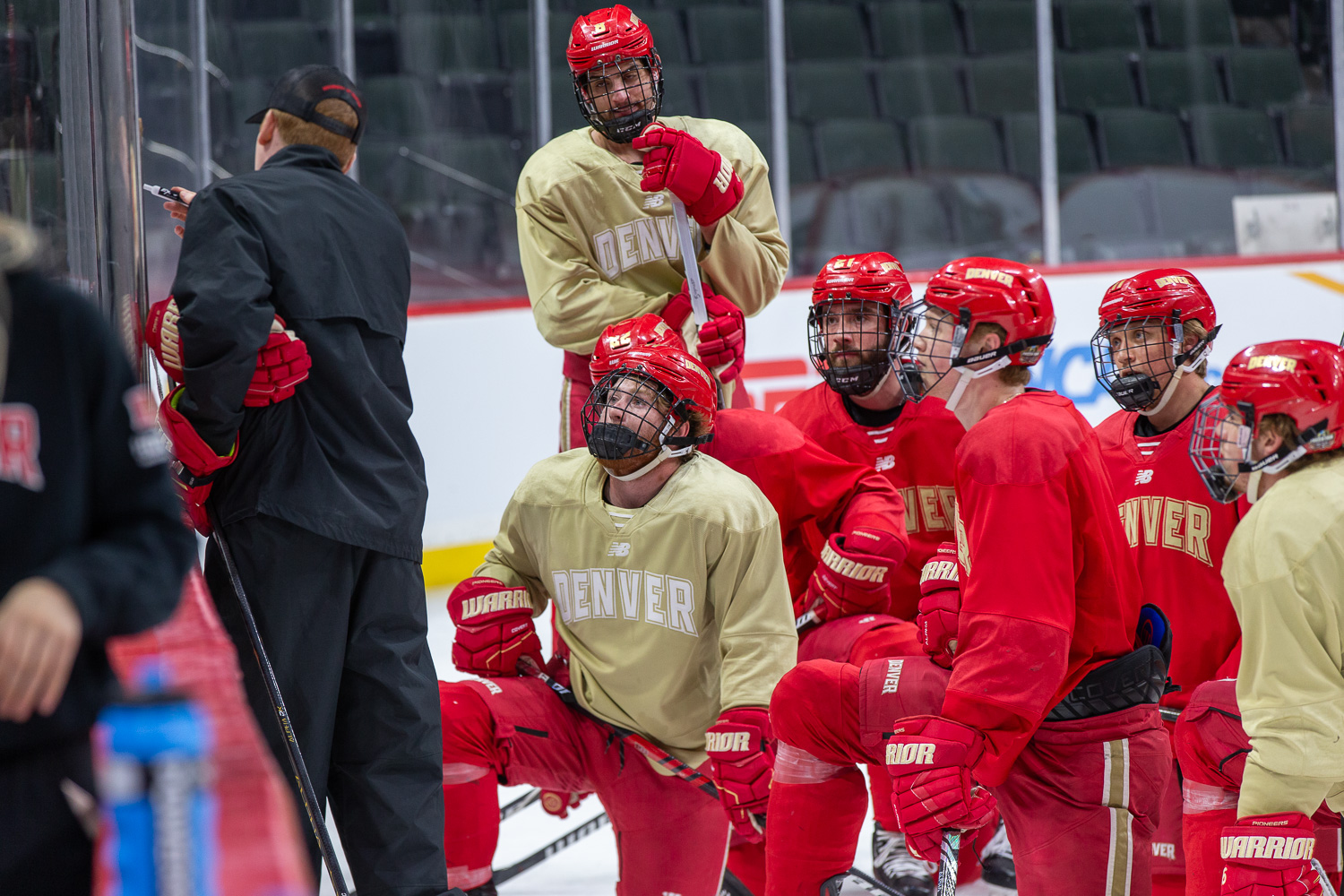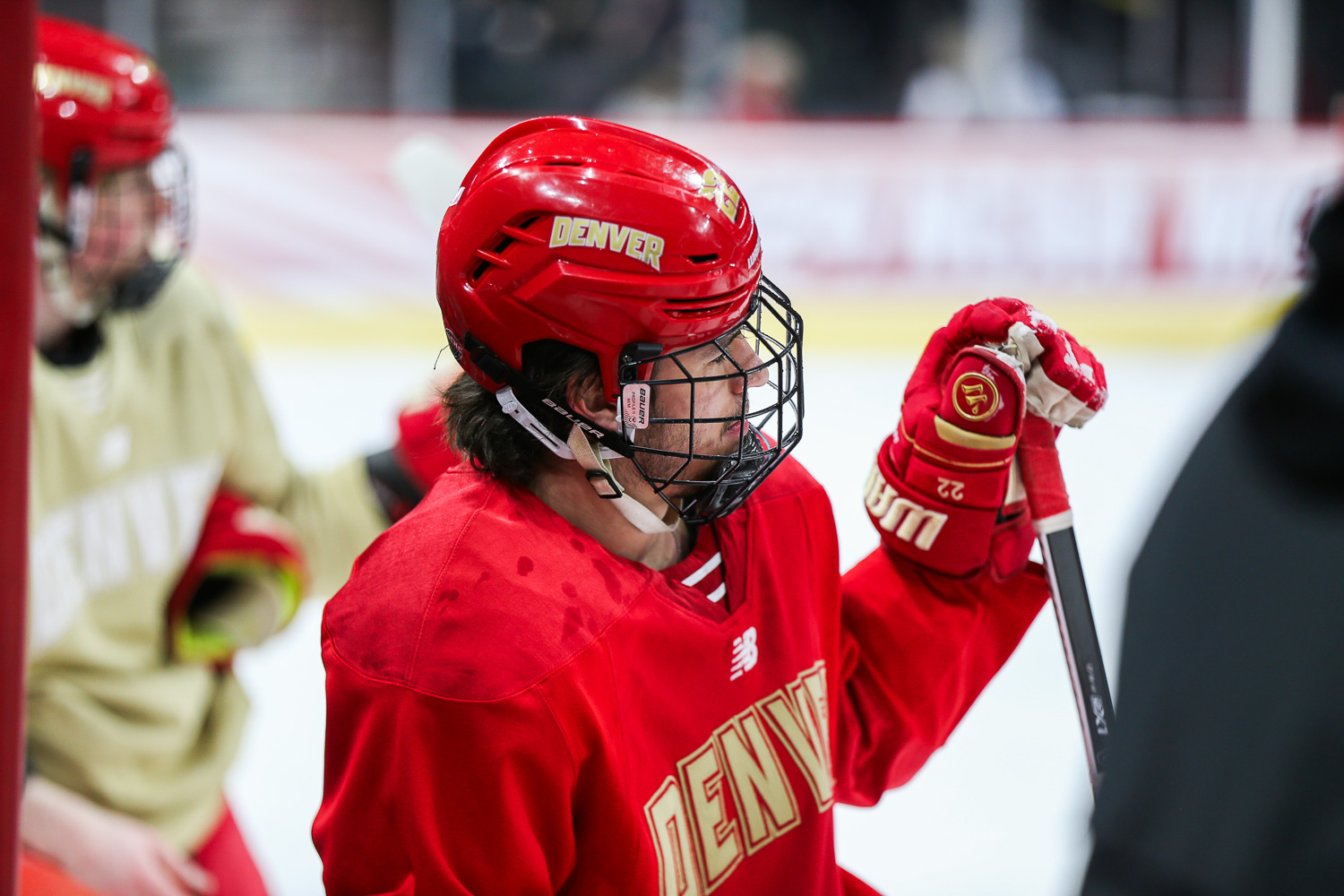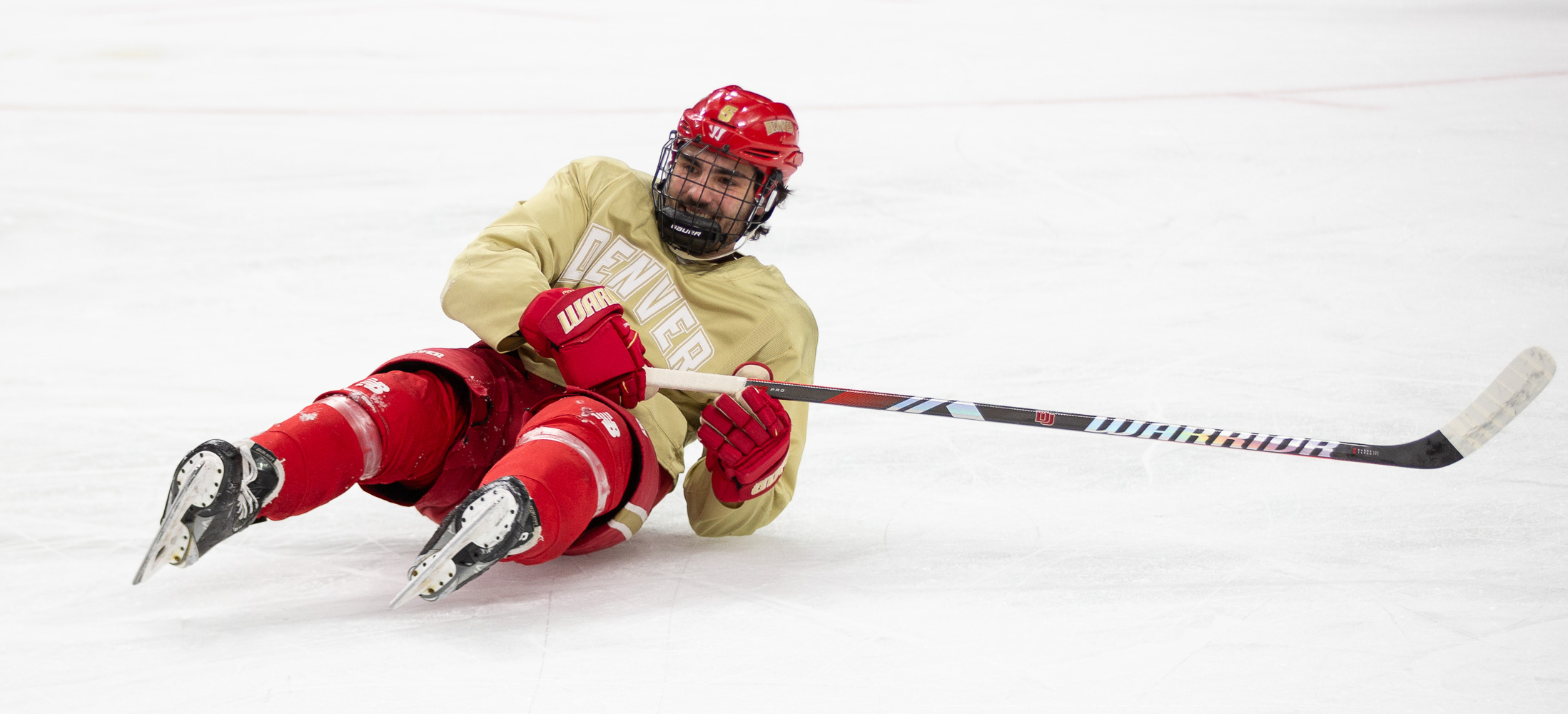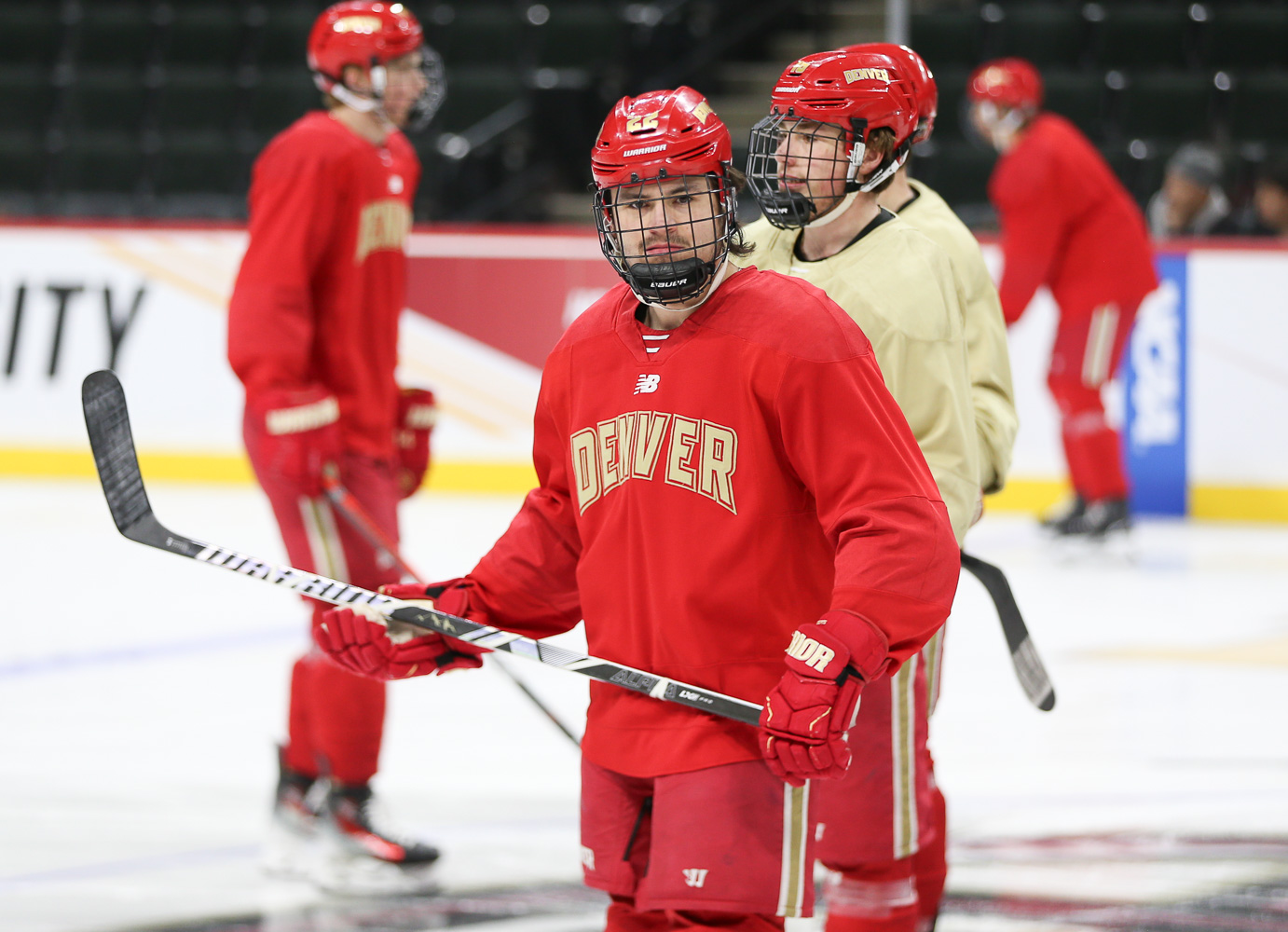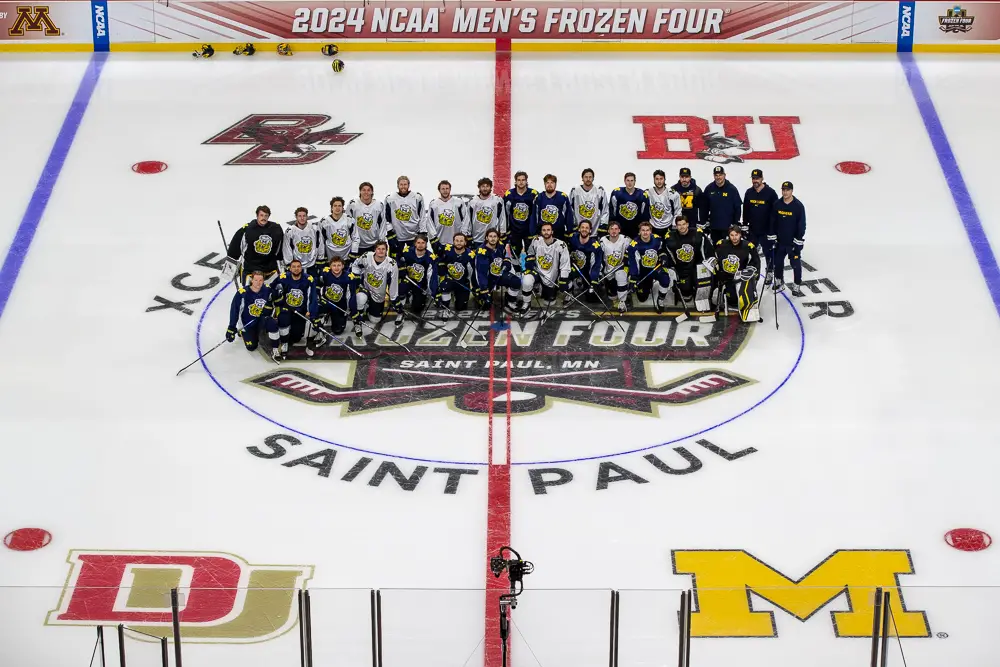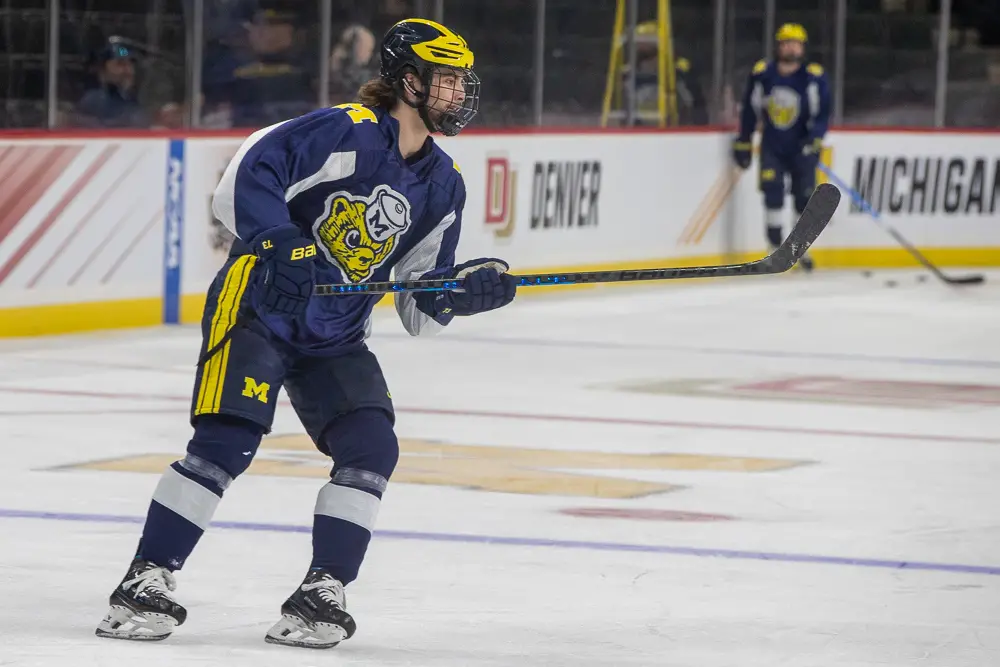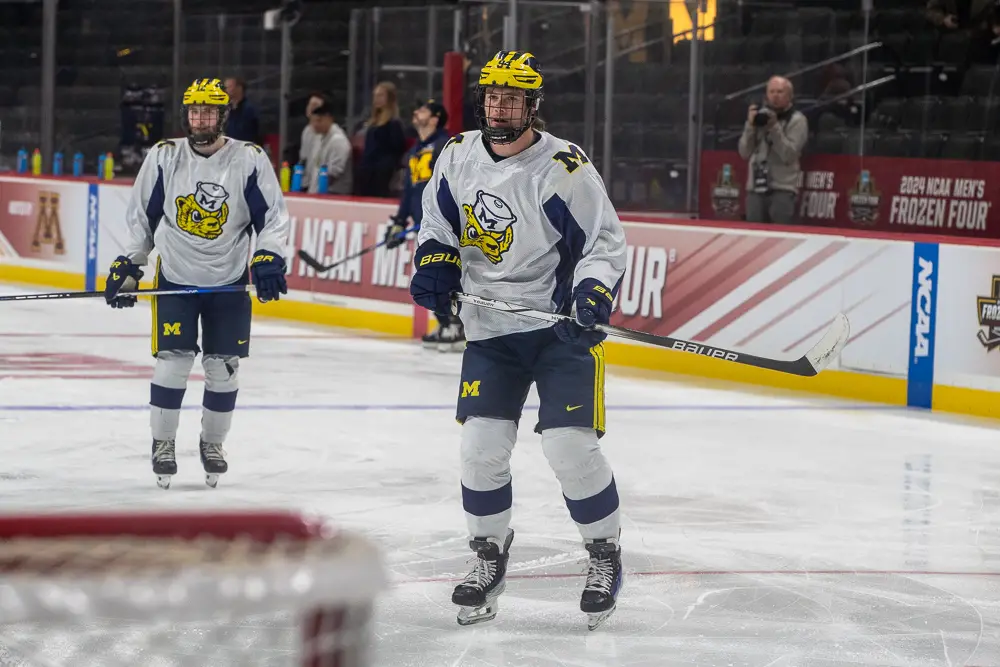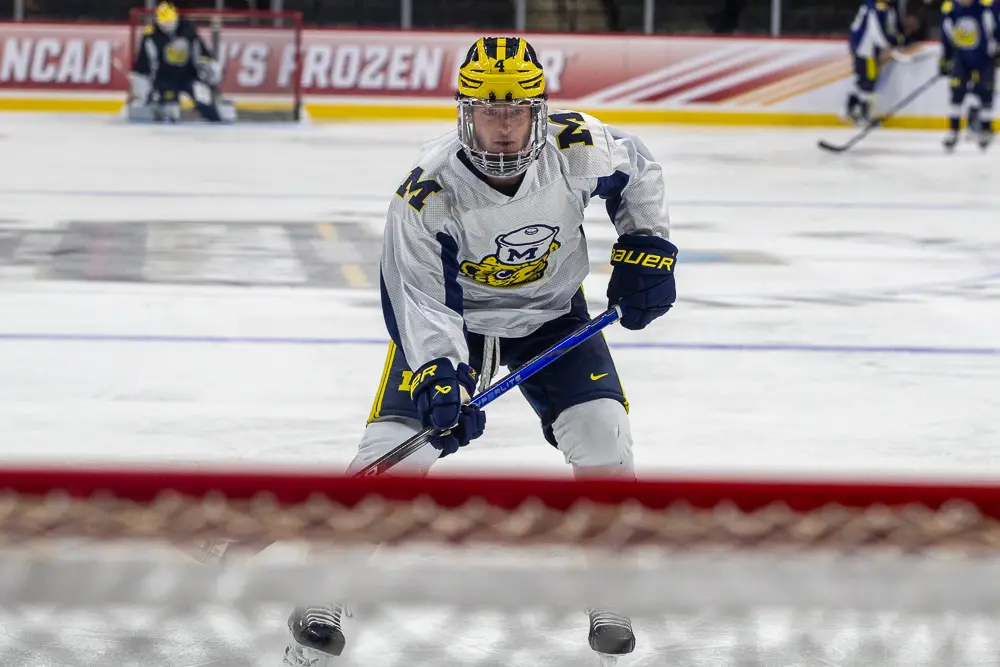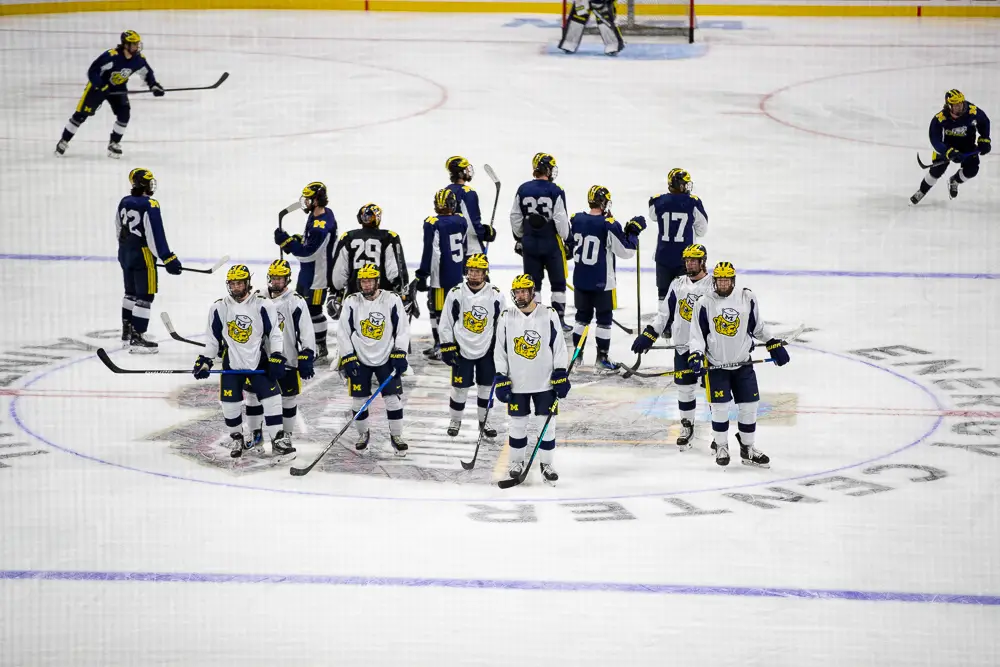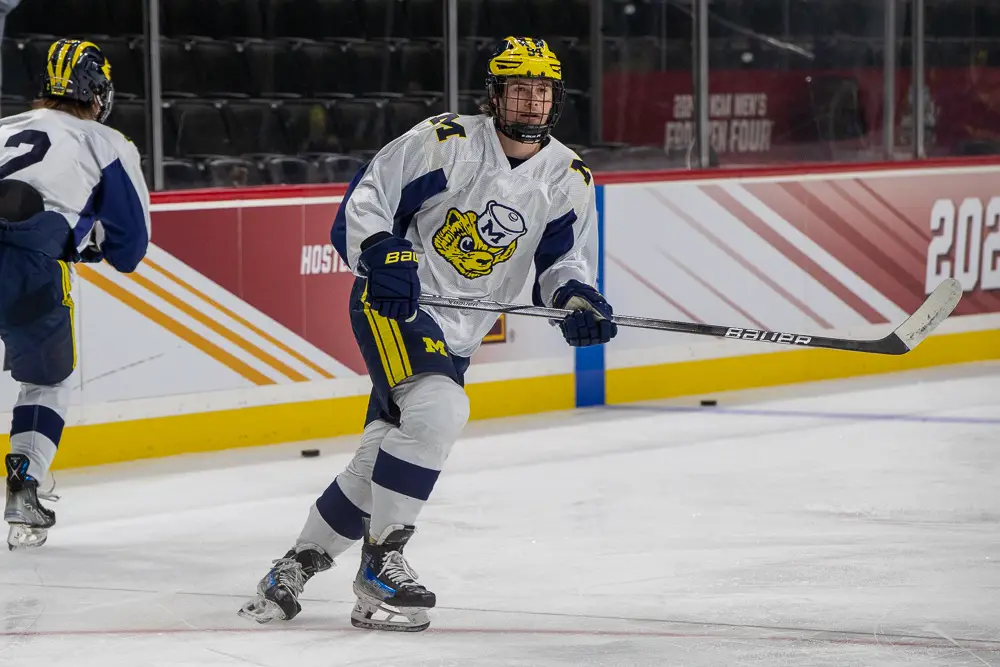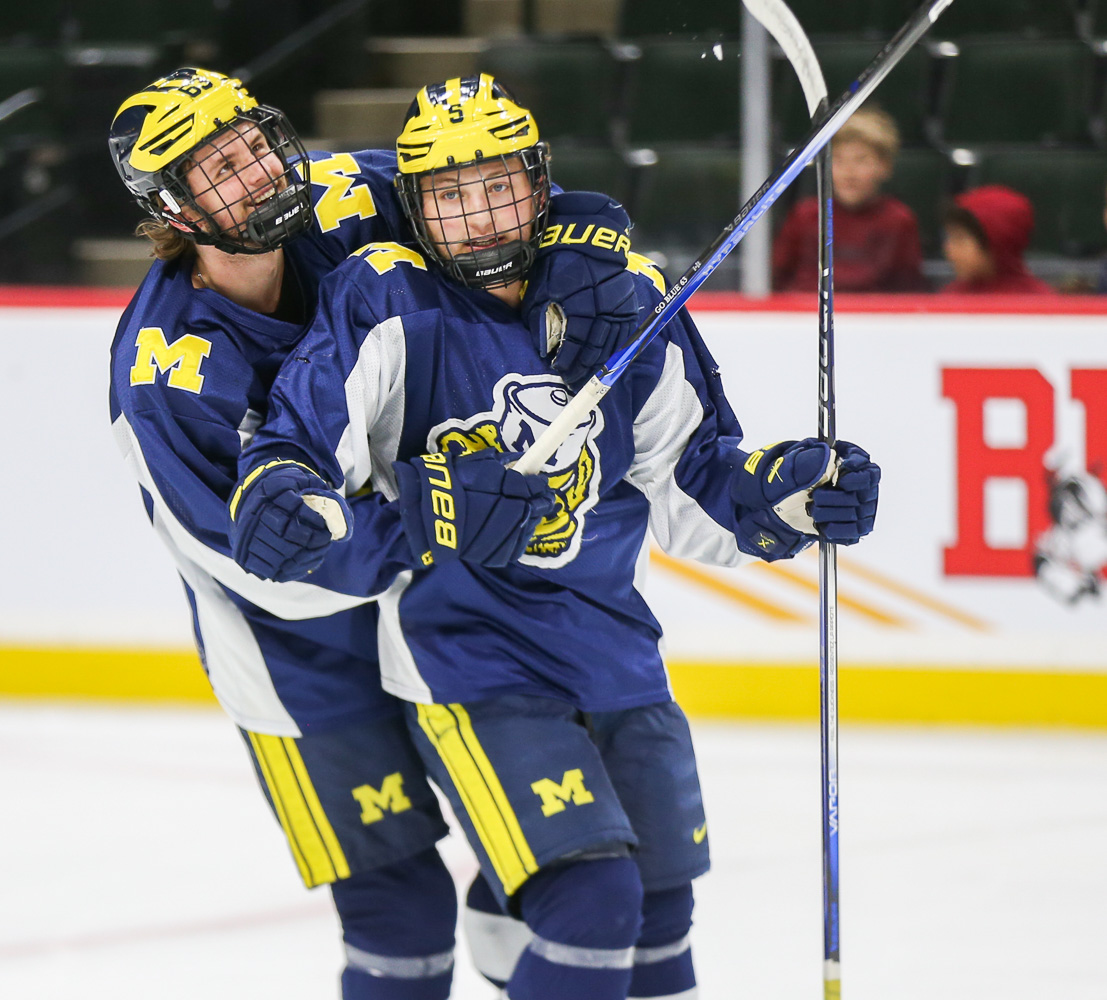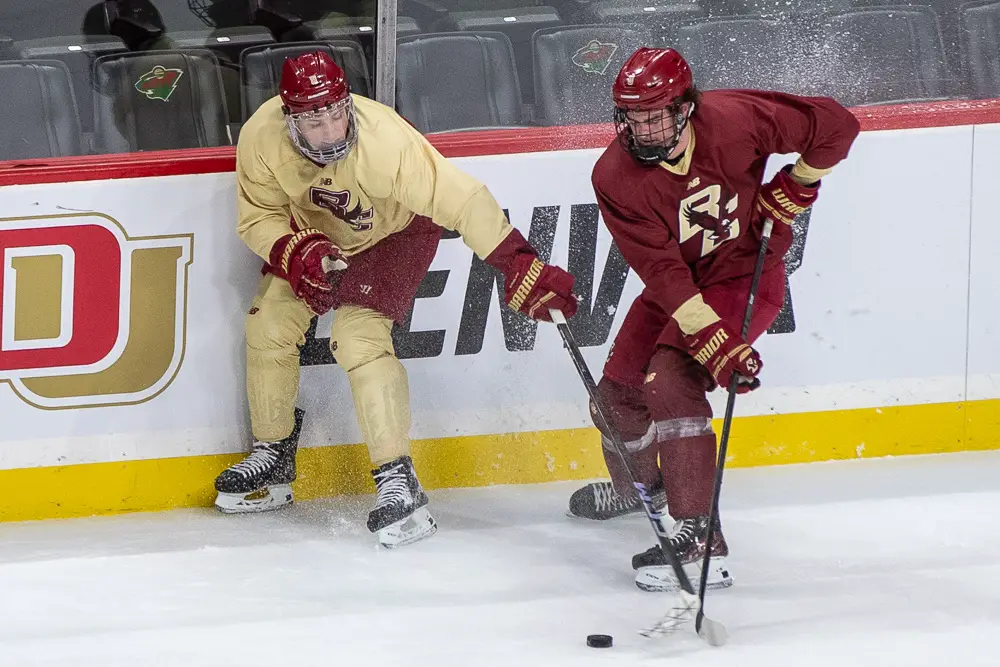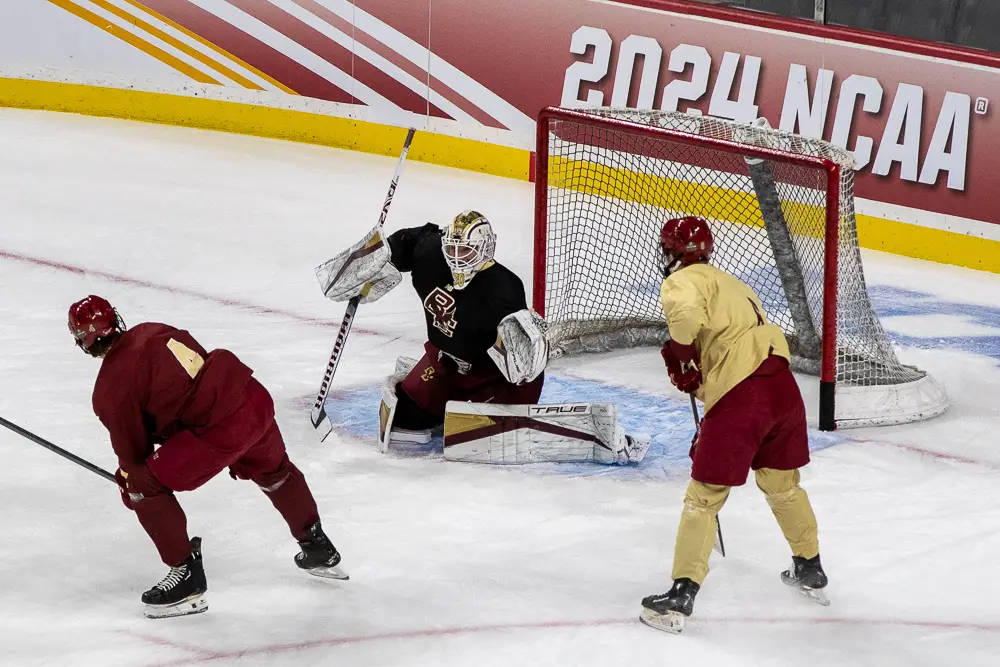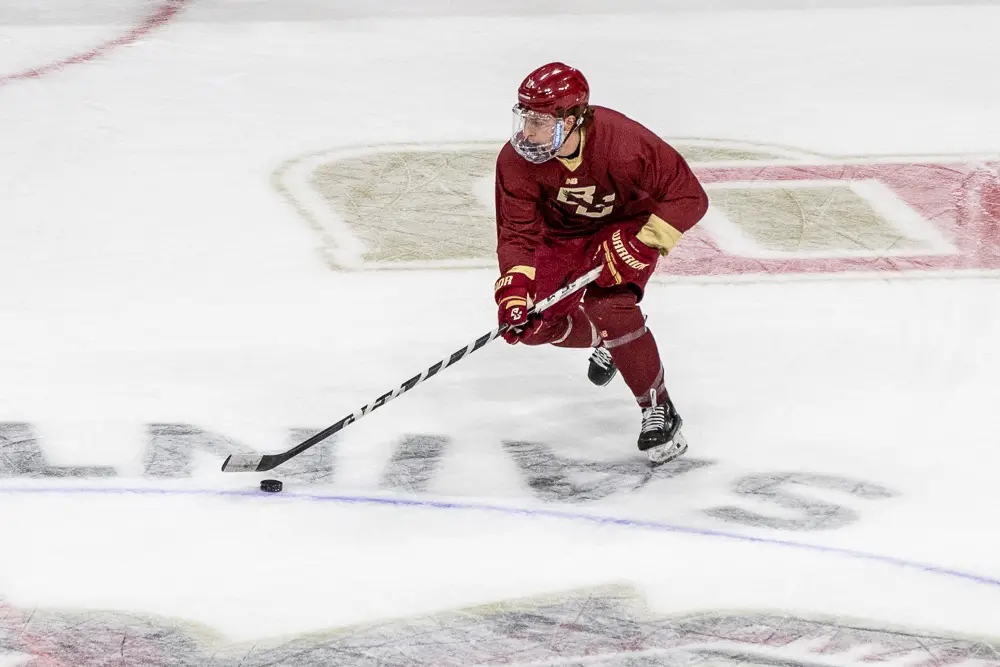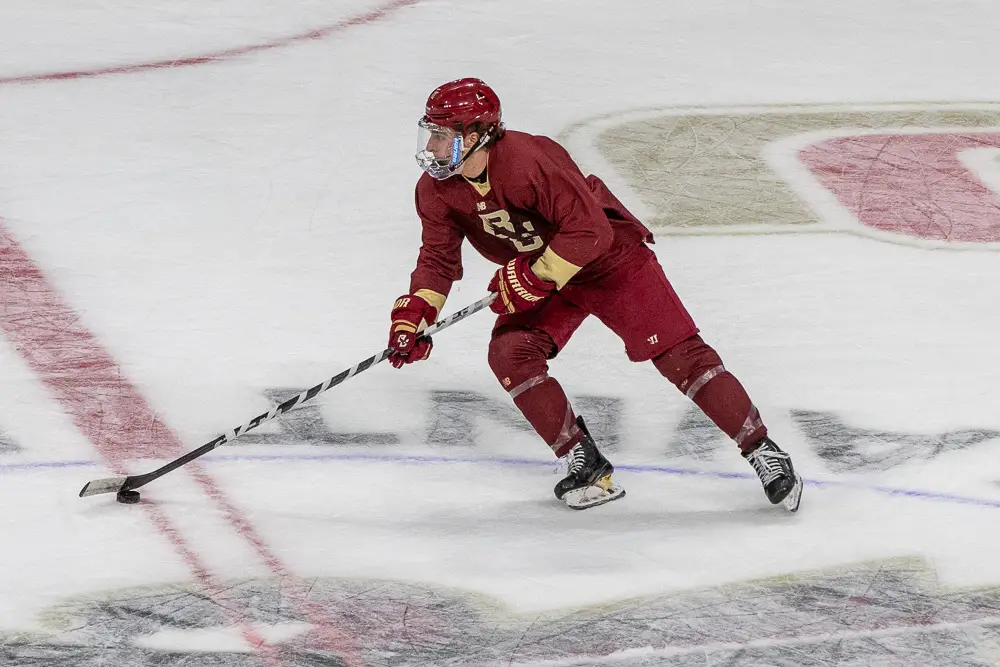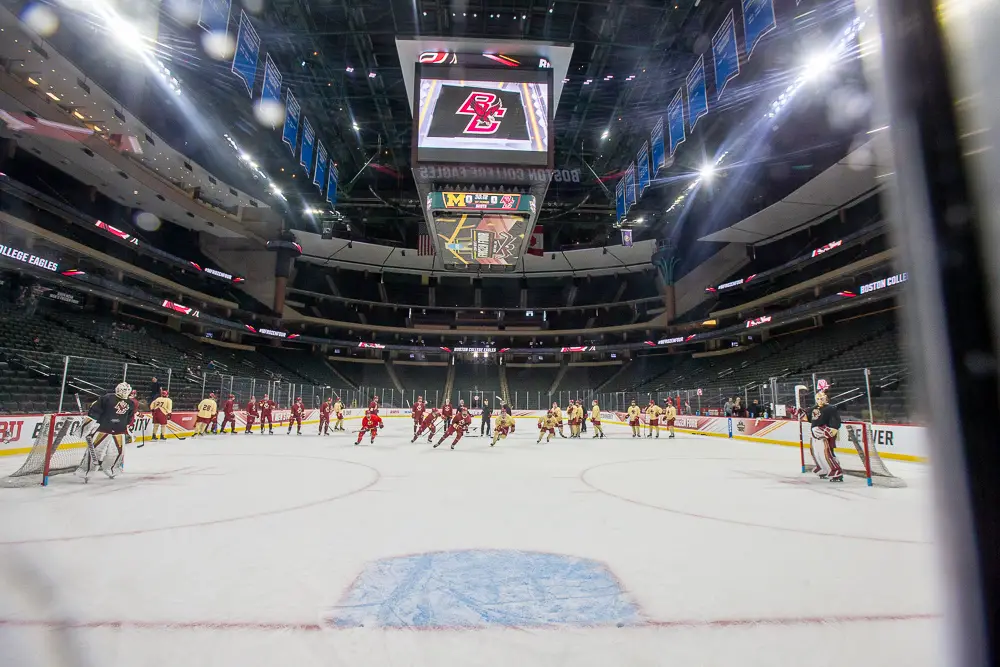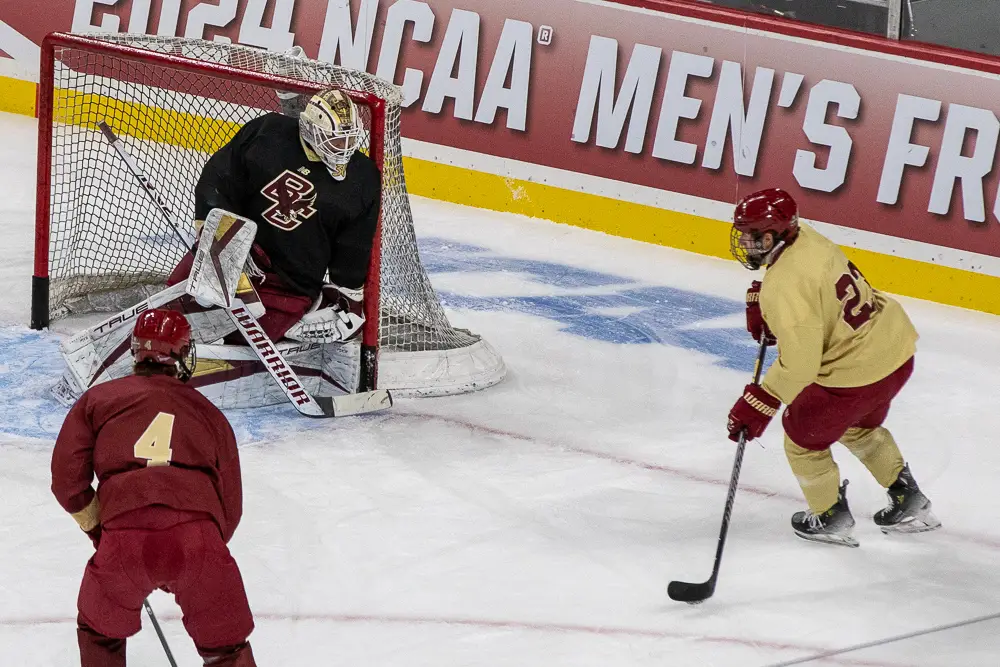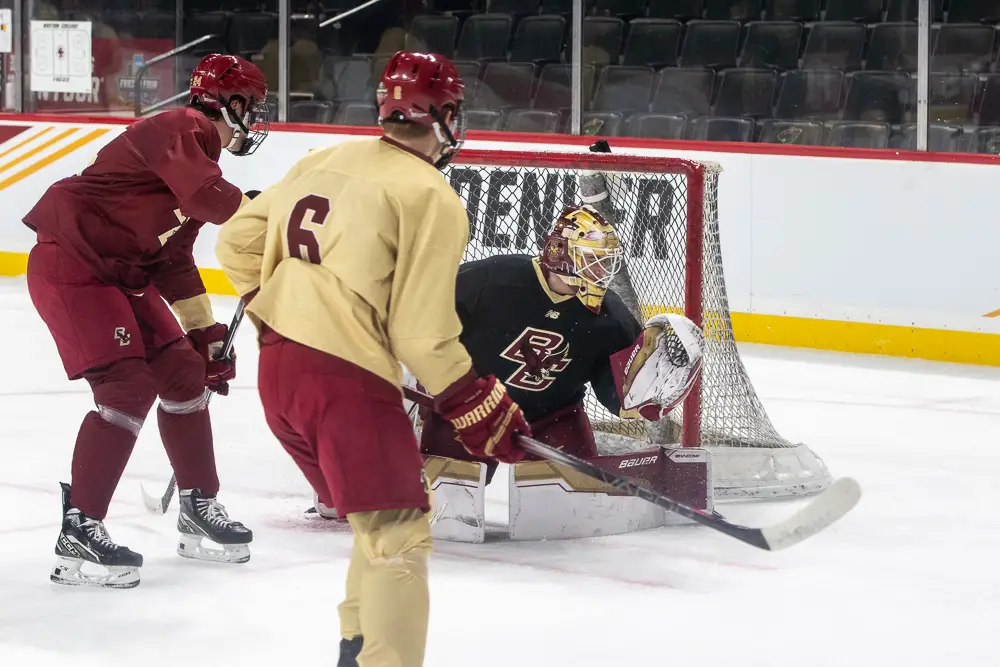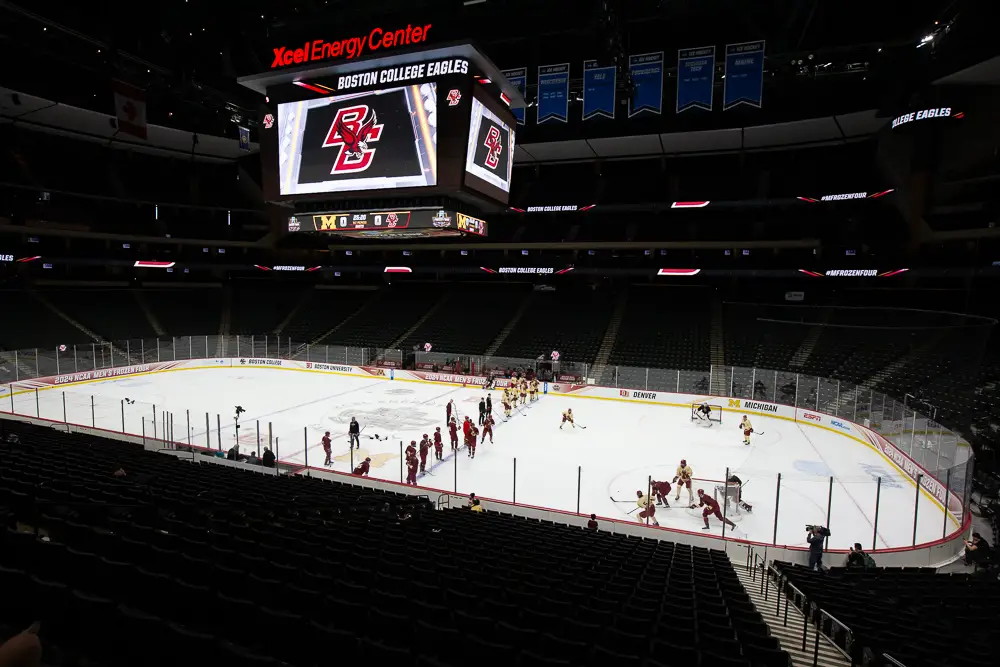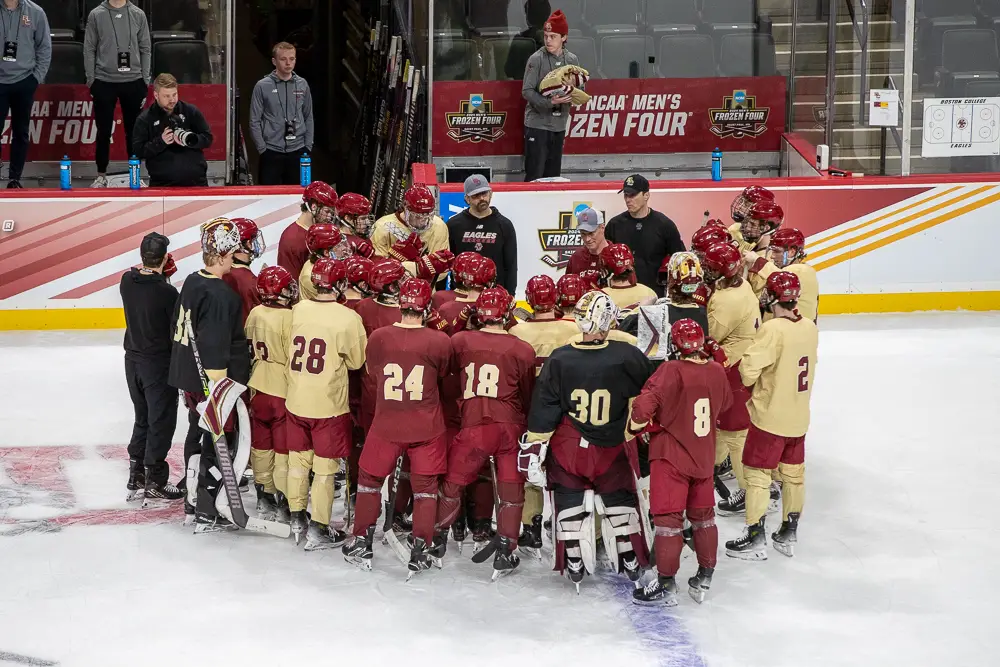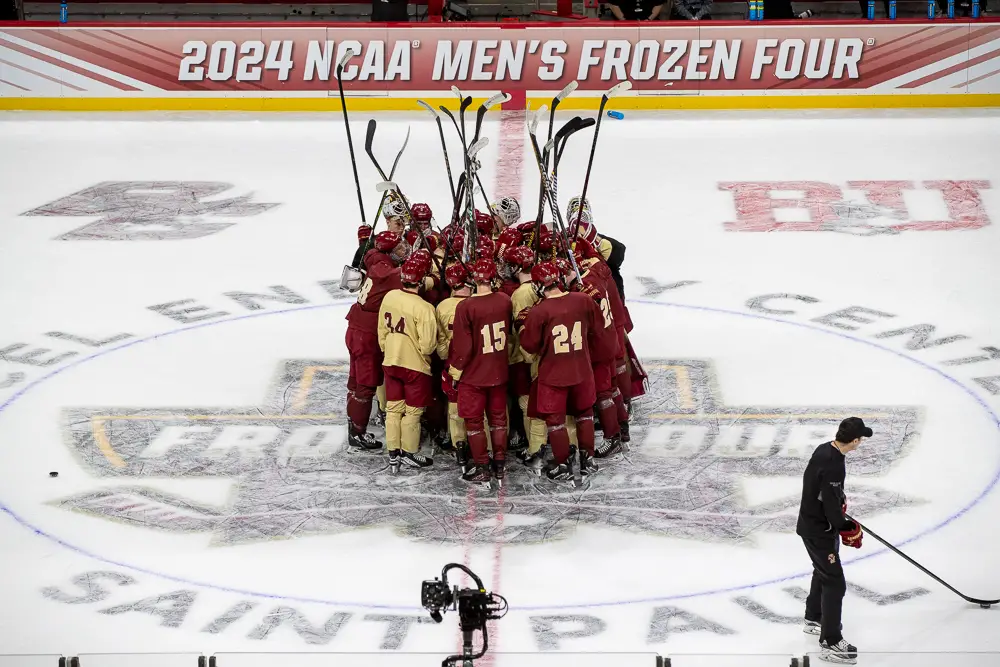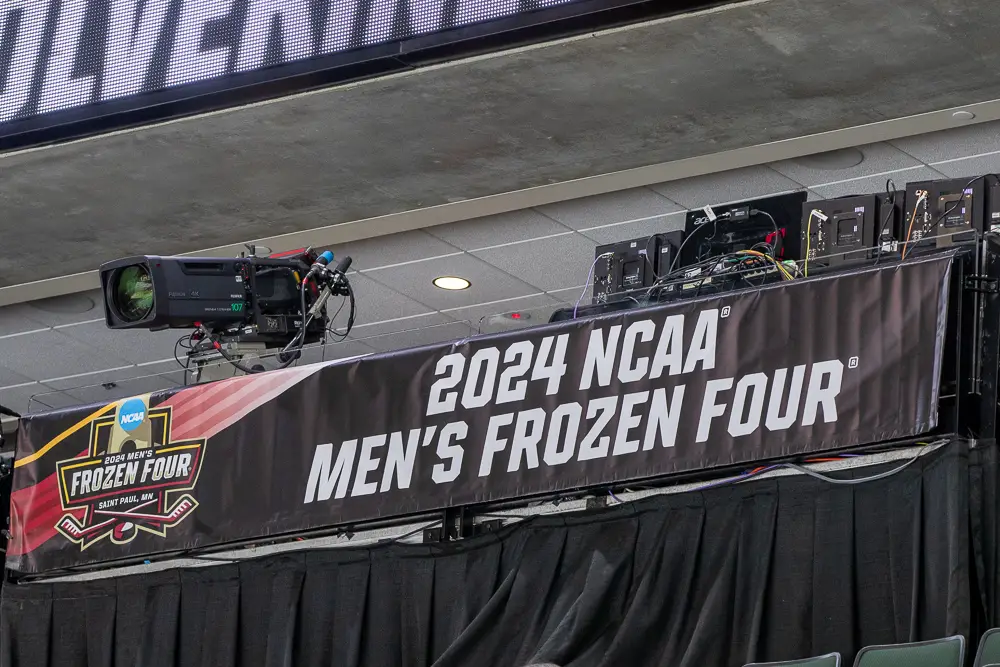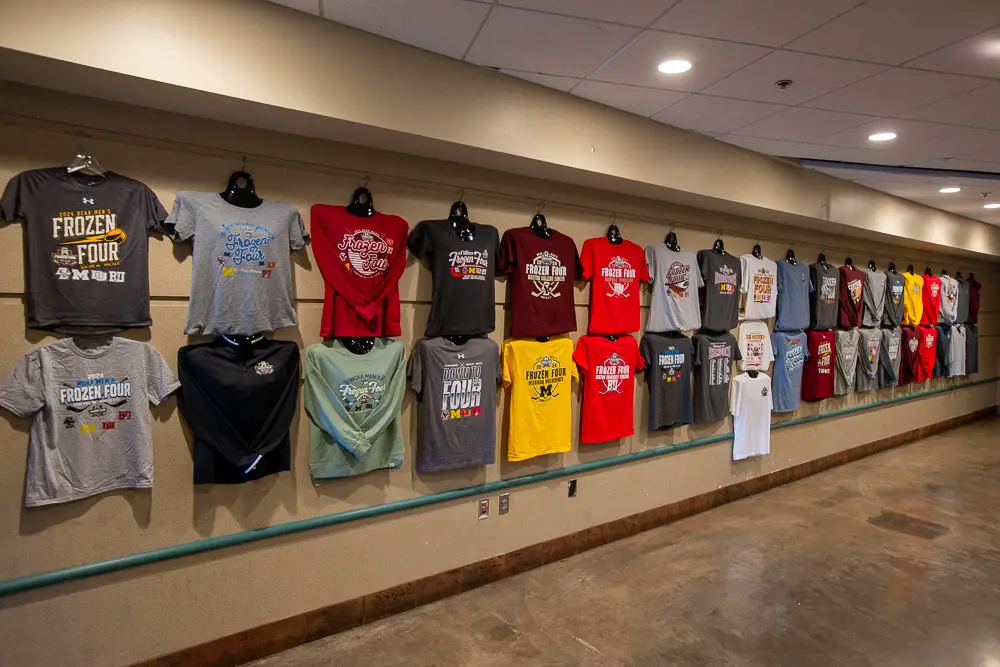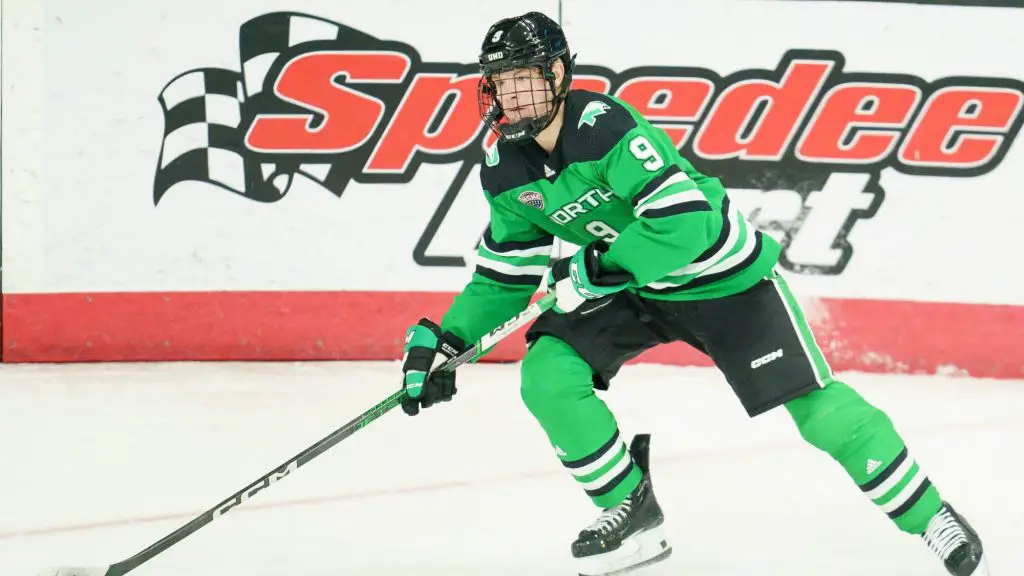ST. PAUL, Minn. — Here are photos from Boston College’s 4-0 win over Michigan in the Men’s Frozen Four semifinals on Thursday at Xcel Energy Center.
Photos: Top shots from Boston College’s win over Michigan in Men’s Frozen Four
Denver, Boston University need overtime to decide Frozen Four semifinal

ST. PAUL, Minn. — Boston University’s Luke Tuch scored short-handed in the first and Denver’s Tristan Lemyre took advantage of a Terriers mistake in the second as BU and Denver were tied after regulation play in the opening semifinal of the 2024 Men’s Frozen Four on Thursday.
Denver began the overtime period with a 47-second power play after BU’s Dylan Petersen was whistled for boarding at 18:47 of the third.
Power plays were the story of the game. The Terriers put Denver on the man advantage four times, including three times in the third.
Denver did not take a penalty through regulation.
The Terriers began the game fast as Devin Kaplan was stopped on a one-timer by Denver goaltender Matt Davis just 45 seconds in. Denver didn’t have a shot until 5:50 of the first, but that led to Carter King with a great look on a rebound that BU’s Mathieu Caron stopped.
Seconds later, the Terriers took the game’s first penalty but instead of Denver’s power play capitalizing, BU scored short-handed.
Kaplan flicked a quick pass to Tuch that sent him past the Pioneers defense on a breakaway. Kaplan ripped a shot up high for his first career short-handed goal at 7:45.
Through the middle frame, the Terriers continued to hold a strong territorial advantage but a mental mistake by All-American defenseman Lane Hutson allowed Denver to strike back.
Behind his net, Hutson made a blind pass that was perfectly anticipated by Miko Matikka. He intercepted the puck and fed quickly to a wide-open Lemyre, who fired the puck five-hole on Caron at 15:21 to even the score. The goal came on just the eighth Pioneers shot of the game.
That goal gave Denver life, and the Pioneers hemmed the Terriers in their zone for the remainder of the second. With 23.4 seconds left, it looked as if Aidan Thompson would give the Pioneers their first lead when Davis made a perfect stretch pass to spring a 2-on-1. Appearing to be beat, Caron reached behind him for a glove save that robbed Thompson, sending the game to the third tied at 1.
Caron remained sharp in the third with his biggest save coming on Denver’s scoring leader Jack Devine as a Denver power play ended. A rebound popped right to Devine’s stick and he made a move past Caron, but the junior netminder reached his arm across to stop the puck with 9:13 left.
At the other end of the ice, it wasn’t so much the goaltender stealing the show, but the post. Lane Hutson took a feed from Macklin Celebrini with 3:33 left and ripped it off the inside of the post.
Boston University led in shots through regulation 25-23 but Denver outshot the Terriers in the third 12-5.
Denver, Boston University tied after two periods in Frozen Four semifinals

ST. PAUL, Minn. — Boston University’s Luke Tech scored short-handed in the first and Denver’s Tristan Lemyre took advantage of a Terriers mistake in the second as BU and Denver were tied through two periods of play in the opening semifinal of the 2024 Men’s Frozen Four.
The Terriers began the game fast as Devin Kaplan was stopped on a one-timer by Denver goaltender Matt Davis just 45 seconds in. Denver didn’t have a shot until 5:50 of the first, but that led to Carter King with a great look on a rebound that BU’s Mathieu Caron stopped.
Seconds later, the Terriers took the game’s first penalty but instead of Denver’s power play capitalizing, BU scored short-handed.
Kaplan flicked a quick pass to Tuch that sent him past the Pioneers defense on a breakaway. Kaplan ripped a shot up high for his first career short-handed goal at 7:45.
Through the middle frame, the Terriers continued to hold a strong territorial advantage but a mental mistake by All-American defenseman Lane Hutson allowed Denver to strike back.
Behind his net, Hutson made a blind pass that was perfectly anticipated by Miko Matikka. He intercepted the puck and fed quickly to a wide-open Lemyre, who fired the puck five-hole on Caron at 15:21 to even the score. The goal came on just the eighth Pioneers shot of the game.
That goal gave Denver life, and the Pioneers hemmed the Terriers in their zone for the remainder of the second. With 23.4 seconds left, it looked as if Aidan Thompson would give the Pioneers their first lead when Davis made a perfect stretch pass to spring a 2-on-1. Appearing to be beat, Caron reached behind him for a glove save that robbed Thompson, sending the game to the third tied at 1.
Boston University leads Denver after one period on Tuch’s short-handed goal

ST. PAUL, Minn. — Thanks to a Luke Tuch short-handed goal, Boston University held a 1-0 lead over Denver through one period in the opening semifinal of the 2024 Men’s Frozen Four.
The Terriers began the period fast as Devin Kaplan was stopped on a one-timer by Denver goaltender Matt Davis just 45 seconds into the game. Denver had its own grade A opportunity at 5:50 when Carter King had a great look on a rebound that BU’s Mathieu Caron stopped.
Seconds later, the Terriers took the game’s first penalty but instead of Denver’s power play capitalizing, BU scored short-handed.
Kaplan flicked a quick pass to Tuch that sent him past the Pioneers defense on a breakaway. Kaplan ripped a shot up high for his first career short-handed goal at 7:45.
Boston University held a distinct territorial advantage in the opening frame, evident by a 10-3 advantage in shots.
A short-handed breakaway gives Boston University the first goal of the 2024 Men’s Frozen Four
ST. PAUL, Minn. — Luke Tuch’s short-handed breakaway in the first period Thursday provided the first goal of the 2024 NCAA Men’s Frozen Four.
Tuch scored 7:45 into the first period to give Boston University a 1-0 lead over Denver in the national semifinals.
Here’s a look at the goal.
THE TERRIERS WITH THE SHORTY!!! 🤩
📺 ESPN2 #MFrozenFour x @TerrierHockey pic.twitter.com/sixhKSjVps
— NCAA Ice Hockey (@NCAAIceHockey) April 11, 2024
Watch: USCHO’s Jim Connelly, Derek Schooley preview Men’s Frozen Four semifinals
ST. PAUL, Minn. — What will it take for Boston University, Denver, Boston College and Michigan to get to the NCAA championship game? USCHO’s Jim Connelly and Derek Schooley, head coach at Robert Morris, discuss some of the factors ahead of Thursday’s NCAA Men’s Frozen Four semifinal games.
Thursday replay on demand: USCHO Frozen Four Live! at 2024 NCAA Men’s Frozen Four
USCHO podcasts are going on the road, and you can join us for live broadcasts during the 2024 NCAA Men’s Frozen Four in St. Paul, Minn., including Thursday from noon until 2 p.m. CT.
USCHO Frozen Four Live! with Ed Trefzger, Jim Connelly and Derek Schooley will have live events featuring special guests and giveaways on four days at Tom Reid’s Hockey City Pub, 258 7th St W, near the Xcel Energy Center.
Scheduled guests are:
| 12:20 p.m. | Doug Christiansen, ECAC |
| 12:40 p.m. | Heather Weems, NCHC |
| 1:00 p.m. | Don Lucia, CCHA |
| 1:20 p.m. | Adam Augustine, Big Ten |
| 1:40 p.m. | Andrew Mahoney, Boston Globe |
Replay:
Here’s rest of the week’s schedule (all times Central):
Friday, April 12: 6 p.m. to 7 p.m.
Saturday, April 13: 1 p.m. to 3 p.m.
If you won’t be in St. Paul, check out the podcast from wherever you are on our site, on Apple Podcasts, in your favorite podcast app, or on Spreaker.
Check out all of USCHO’s college hockey podcasts, including USCHO Weekend Review and USCHO Edge, plus our entire podcast archive.
How to watch and listen to Thursday’s 2024 NCAA Men’s Frozen Four semifinals
ST. PAUL, Minn. — The 2024 NCAA Men’s Frozen Four begins Thursday with the national semifinals.
Boston University plays Denver at 4 p.m. CT at Xcel Energy Center. The second game between Boston College and Michigan is scheduled to begin at 7:30 p.m. CT.
Both games are on ESPN2 and ESPN+ for subscribers, with John Buccigross and Colby Cohen on the call.
Westwood One has rights to radio broadcasts. Brian Tripp, Dave Starman and Shireen Saski are the radio voices.
Disrupting strong offenses key as Boston University, Denver eye Frozen Four opener
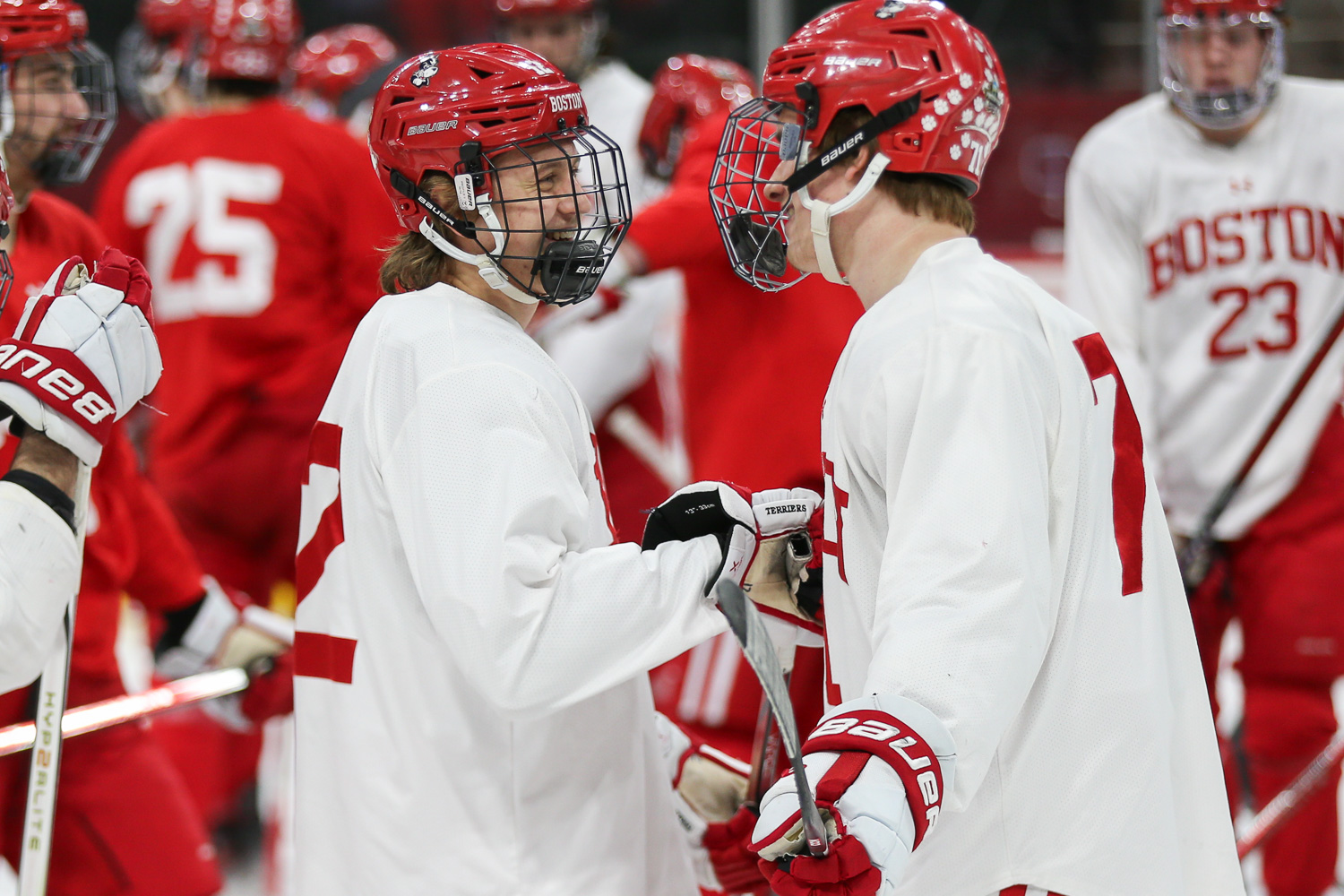
ST. PAUL, Minn. — It takes more than a strong offense to win championships.
For No. 2 overall seed Boston University and No. 3 overall seed Denver, set to face off in the first NCAA Men’s Frozen Four semifinal Thursday, defense isn’t typically the first thought. But it just might come down to who has the better overall play. Disrupting the other team’s rhythm will be what it takes.
Staying focused on the ultimate goal and having a short memory was the key for BU after a blowout loss to archrival and top overall seed Boston College in the Hockey East championship on March 23.
Head coach Jay Pandolfo credited the short turnaround and the long trip halfway across the country to Sioux Falls, S.D., for the regionals the next week as a big part of his team’s success in advancing to St. Paul.
“We were certainly disappointed but we knew we weren’t done,” he said. “Our guys, they took it upon ourselves to move on.”
Macklin Celebrini leads the way for the Terriers as the nation’s No. 2 scorer (32 goals, 32 assists). While the talented 17-year-old Hobey Baker Hat Trick finalist is expected to be the top overall pick in the next NHL draft, he insisted Wednesday that his focus is bringing home the program’s sixth national championship and first since 2009.
The same goes for his teammates. So what will it take to keep pace with Denver’s top-ranked offense of 4.71 goals per game?
“I think for us it’s dictating the way we want to play,” said defenseman Case McCarthy. “I think when we’re playing our style, we’re hard to deal with.
“[Denver is] a deep team. We’ve just got to make sure we manage the game,” Pandolfo said. “We’ve got to make sure that we’re staying above the puck, make sure our reloads are really good, make sure our gaps are good for our D so they don’t have a lot of time and space.”
For the Pioneers, that mighty offense was held in check in the Springfield Regional. But DU qualified for its second Frozen Four in the last three years by winning in a way it couldn’t early in the season — defense.
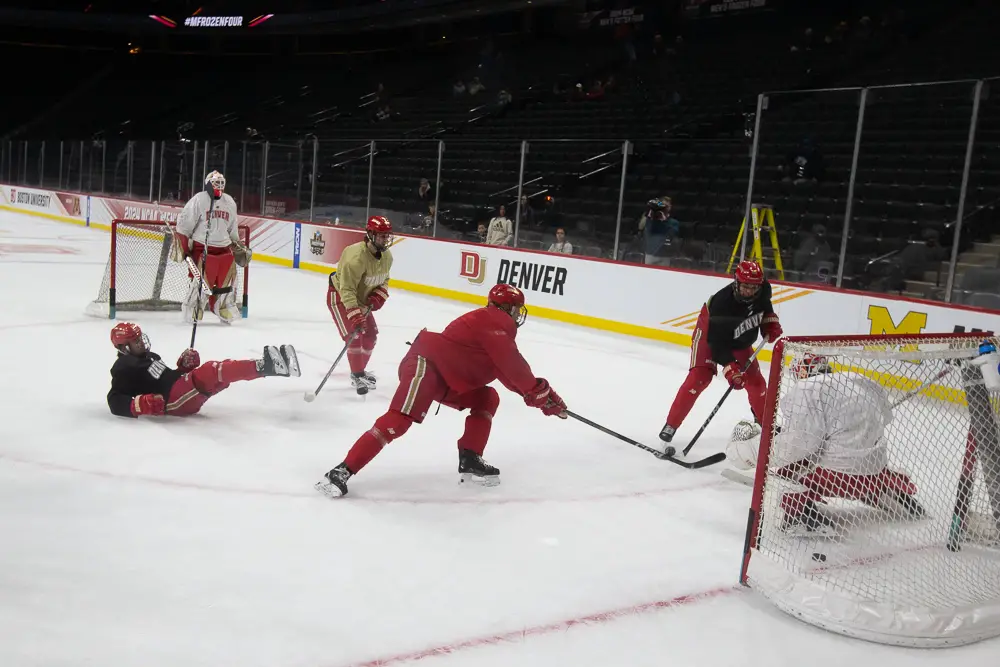
The Pioneers won a pair of 2-1 games over UMass and Cornell in their regional without having to put up big offensive numbers like they did March 22-23 when they took the NCHC Frozen Faceoff championship in the same building they’re playing in this week, the Xcel Energy Center.
They know they’re capable of lighting the lamp any time they want, and the improvement of their defense in the second half to complement the scoring makes them a tough out. But they’re not about to underestimate a skilled Terriers team as they pursue their 10th title.
“We want to play Denver hockey,” forward McKade Webster said. “We want to make them come through us, want to play a 200-foot game stopping on pucks and make them come to us.”
“Every team [here] has offensive weapons,” said Pioneers coach David Carle. “Limit their
opportunities and time and space the best we can, and I think our team showed how committed they are to team defense.”
A tale of 2 Jacobs: Boston College, Michigan goalies bring calming presences from different paths
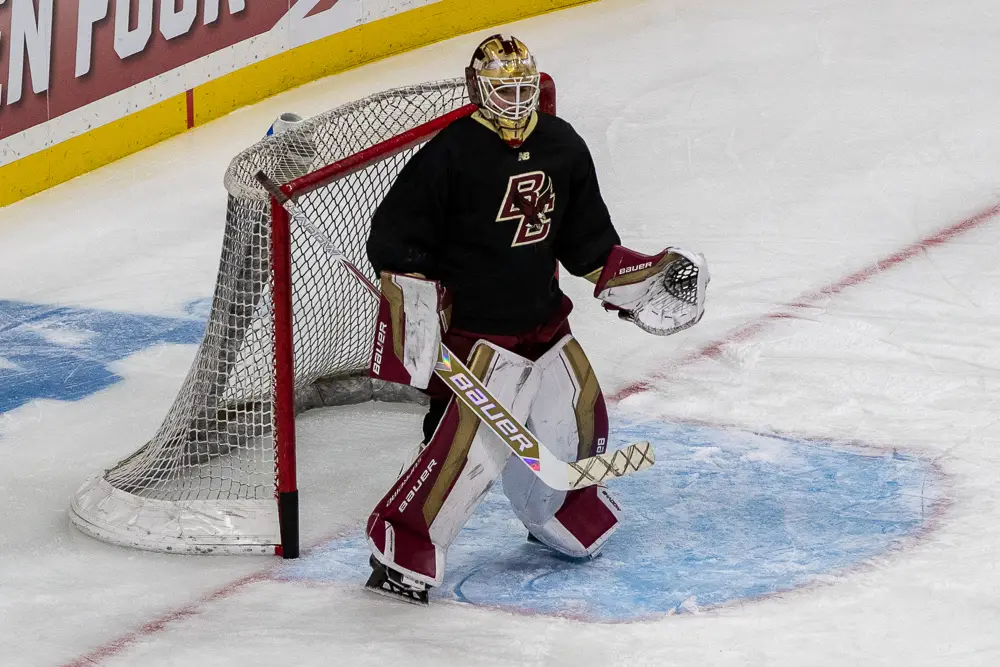
ST. PAUL, Minn. — Besides the formal version of their first names, there’s not a lot in common at first glance between the starting goaltenders in Thursday’s NCAA Men’s Frozen Four semifinal between Michigan and Boston College.
Michigan’s Jake Barczewski and Boston College’s Jacob Fowler will duel with a spot in the national championship game on the line.
Fowler, a freshman, is 19. Barczewski, a graduate student, is 25.
Fowler has won at every level: a USHL title in junior hockey, a gold medal with Team USA at this year’s World Juniors and a Hockey East championship.
Barczewski has taken a longer path to success. He helped deliver an Atlantic Hockey title to Canisius last year, starting 94 games for the Golden Griffins over four seasons before transferring to Michigan. He’s the active career NCAA saves leader with 3,712 and counting.
But both Jacobs have played a major role in getting their teams to St. Paul.
Fowler has 31 wins this season, posting a 2.20 GAA and a .924 save percentage. Barczewski has 30 victories with a 2.81 GAA and a .909 save percentage.
Michigan coach Brandon Naurato said that Barczewski’s experience compliments the Wolverines, who are making their third consecutive trip to the Frozen Four.
“He’s a four-year starter, coming from Canisius,” he said. “Playing in the NCAA tournament (last season), and winning the (Atlantic Hockey) playoff championship with them.
“I think he’s gained a ton of experience this year, playing in big events like the Duel in the D, the Big Ten championship on the road and then the NCAA regionals in his hometown (St. Louis).”
Fowler’s track record of success before coming to BC has helped settle a young team, Eagles coach Greg Brown said.
“He showed early on that he’s got a calmness to his demeanor,” said Brown. “He doesn’t get rattled by anything. And I think especially with a young team, the guys can feed off of that.
“They see him back there doing his thing. Not that he’s relaxed, but he’s under control all the time. He doesn’t start flailing from side to side or guessing. He just stays right within himself and it’s huge for not only our defense but our whole team.”
The same goes for Barczewski, according to Naurato.
“We believe in ‘Barzo’” Naurato said. “He’s another guy that just brings positive energy and guys want what’s best for him, and I think he’s going to be outstanding on Thursday night.”
Wednesday episode on demand: USCHO Frozen Four Live! at 2024 NCAA Men’s Frozen Four
USCHO podcasts are going on the road, and you can join us for live broadcasts during the 2024 NCAA Men’s Frozen Four in St. Paul, Minn., including this replay of our Wednesday podcast.
USCHO Frozen Four Live! with Ed Trefzger, Jim Connelly and Derek Schooley will have live events featuring special guests and giveaways on four days at Tom Reid’s Hockey City Pub, 258 7th St W, near the Xcel Energy Center.
Our guests were:
- Steve Metcalf, Hockey East Commissioner
- Mike Snee, College Hockey Inc. Executive Director
- Jess Myers, The Rink Live
- Neil Koepke, veteran hockey writer and broadcaster
- Paul Caponigri, Big Ten Network and ESPN
Replay:
Here’s rest of the week’s schedule (all times Central):
Thursday, April 11: Noon to 2 p.m.
Friday, April 12: 6 p.m. to 7 p.m.
Saturday, April 13: 1 p.m. to 3 p.m.
If you won’t be in St. Paul, check out the podcast from wherever you are on our site, on Apple Podcasts, in your favorite podcast app, or on Spreaker.
Check out all of USCHO’s college hockey podcasts, including USCHO Weekend Review and USCHO Edge, plus our entire podcast archive.
Photos: Frozen Four teams practice in St. Paul
ST. PAUL, Minn. — Boston University, Denver, Michigan and Boston College practiced Wednesday at Xcel Energy Center in advance of Thursday’s NCAA Men’s Frozen Four semifinals. Here’s how it looked in photos.
Watch: Boston College wraps up Wednesday practices at the Frozen Four
ST. PAUL, Minn. — No. 1 overall seed Boston College was the last of four teams to practice on the Xcel Energy Center ice on Wednesday, the day before the 2024 NCAA Men’s Frozen Four opens with the semifinals. The Eagles will play Michigan after Boston University faces Denver.
Here’s a look at the Eagles’ practice:
Watch: A glimpse at Michigan’s practice before the Frozen Four begins
ST. PAUL, Minn. — Michigan was the third team to practice at the Xcel Energy Center on Wednesday, the day before the Wolverines play Boston College in the NCAA Men’s Frozen Four semifinals.
Here’s a look at the Wolverines’ session:
Watch: A look at Denver’s practice before the Frozen Four semifinals
ST. PAUL, Minn. — Denver plays Boston University in the first NCAA Men’s Frozen Four semifinal on Thursday, and the Pioneers were the second team to practice at the Xcel Energy Center on Wednesday.
Here’s a look at some of their practice:
Watch: Boston University practices in St. Paul before NCAA Men’s Frozen Four
ST. PAUL, Minn. — Boston University was the first team to practice Wednesday at the Xcel Energy Center. The Terriers play Denver in Thursday’s NCAA Men’s Frozen Four semifinals.
Here’s a look at some of their hour-long time on the ice.
Boston College’s Brown gets Spencer Penrose Award as Division I men’s hockey coach of the year
ST. PAUL, Minn. — Boston College’s Greg Brown was named the 2024 winner of the Spencer Penrose Award as Division I men’s hockey coach of the year on Wednesday.
Brown led the Eagles to Hockey East regular-season and playoff championships and to the Frozen Four. They’ll play Michigan in the national semifinals on Thursday.
Boston College is 33-5-1 in Brown’s second season leading the team. He was the third Eagles coach to win the award, joining John “Snooks” Kelley in 1959 and 1972 and Len Ceglarski in 1985. Jerry York didn’t win the award during his BC tenure but did at Clarkson in 1977.
Michigan State’s Adam Nightingale was the runner-up for the award.
Brown was the only conference coach of the year who led his team to the Frozen Four this season. A former Eagles captain, he was an assistant at Boston College from 2004 to 2018.
The Eagles have four of the nation’s top six scorers, led by national leader Will Smith at 69 points. Cutter Gauthier is one of three finalists for the Hobey Baker Award, which will be presented Friday.
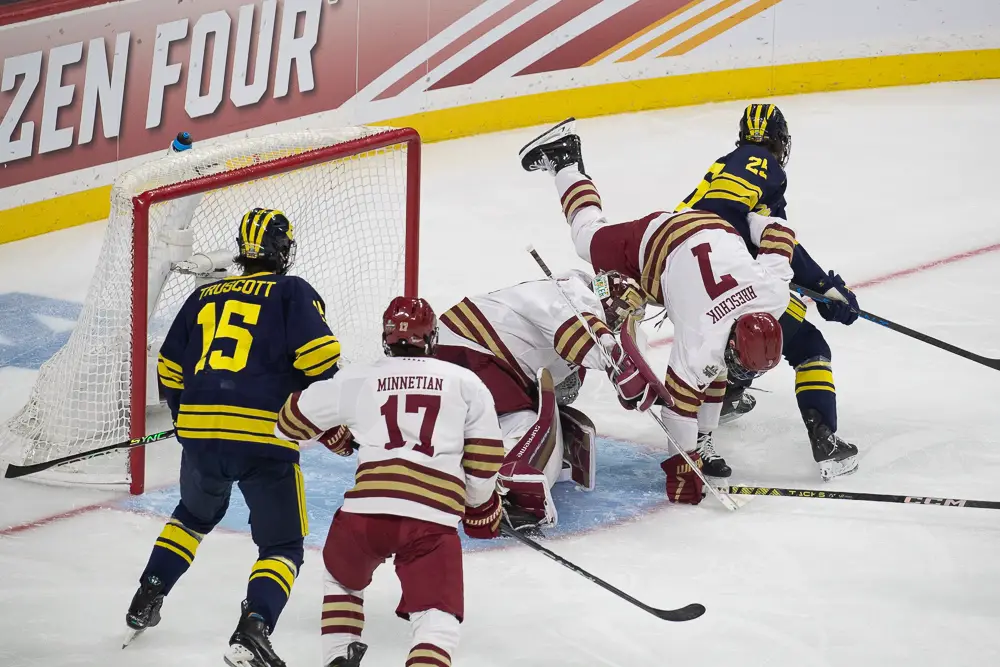
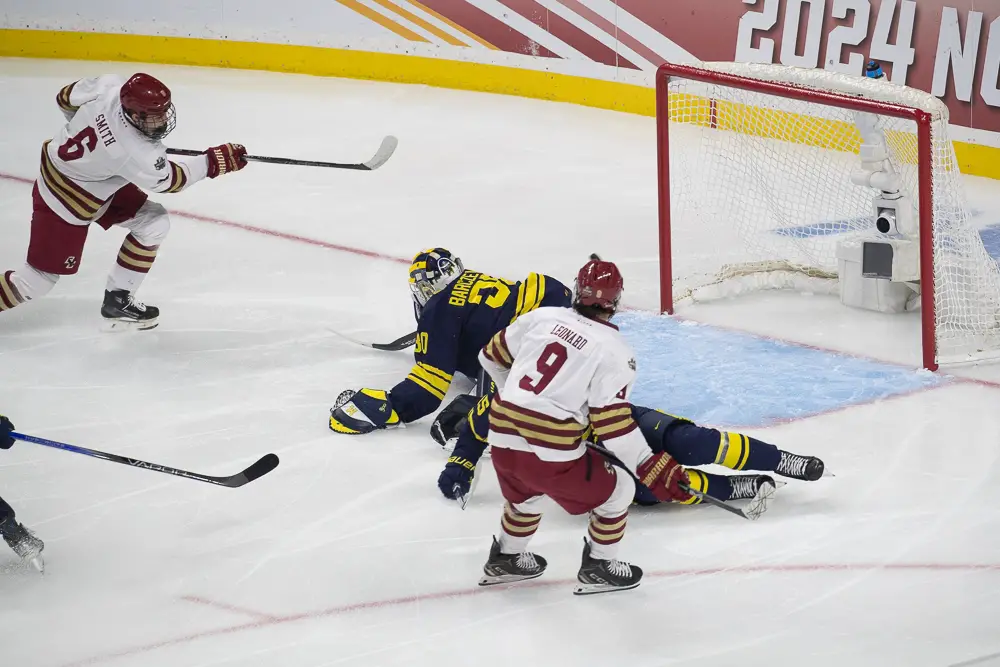
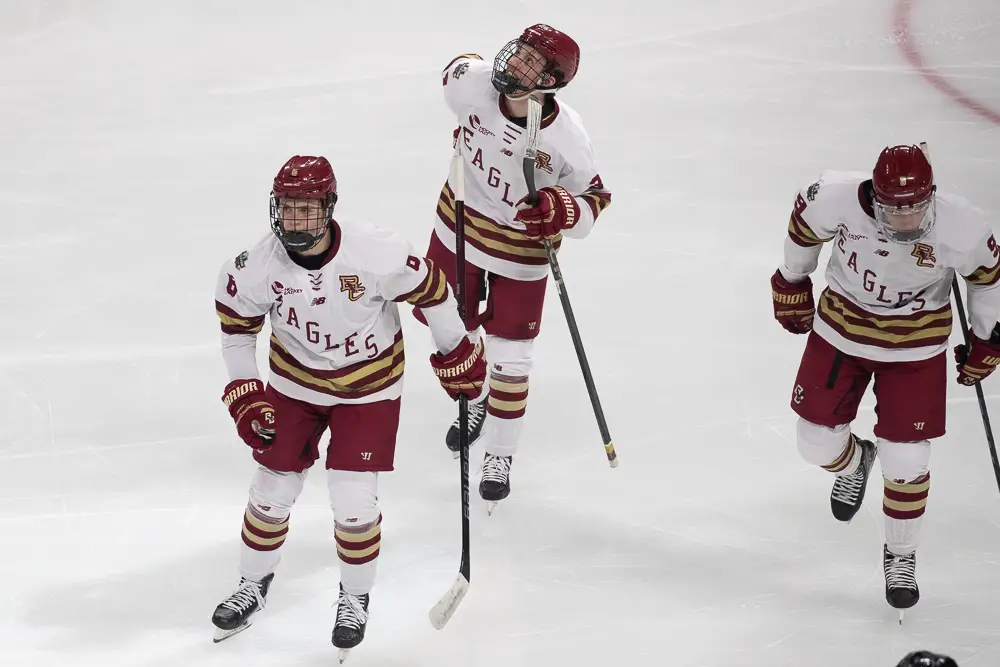
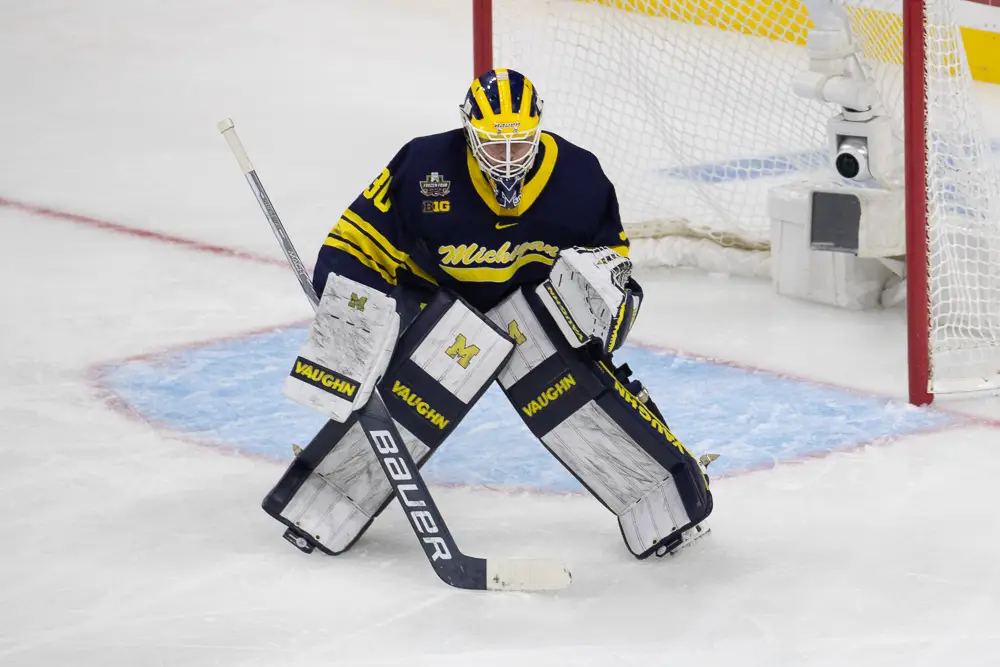
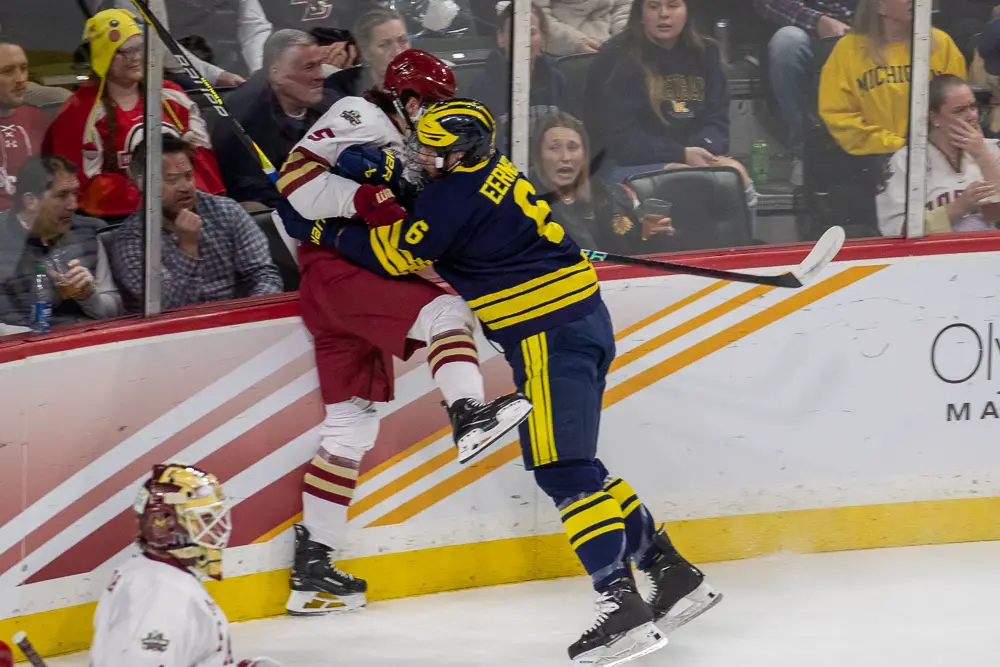
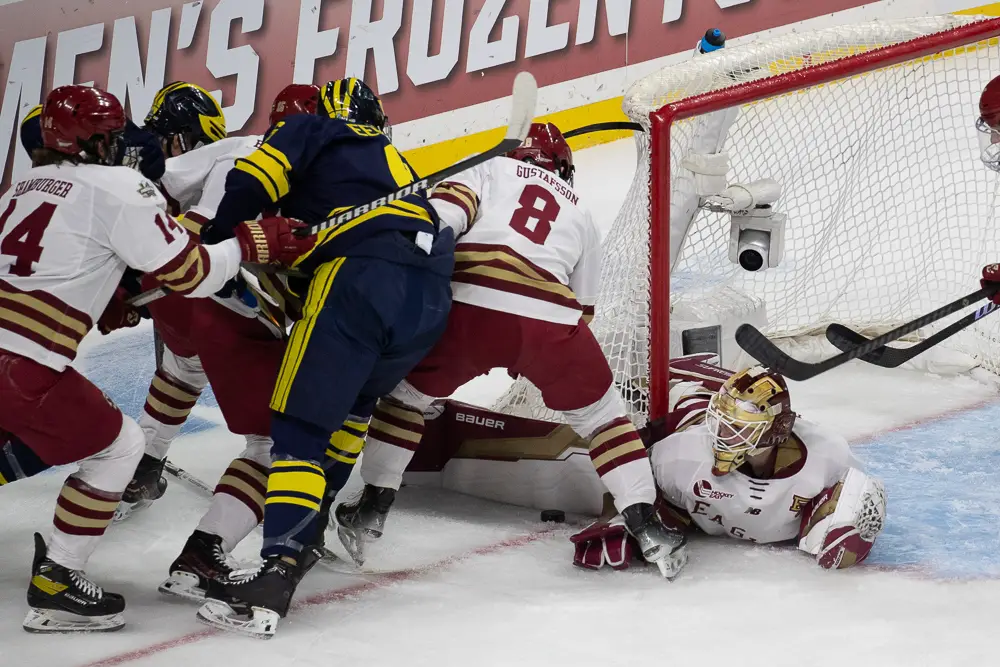
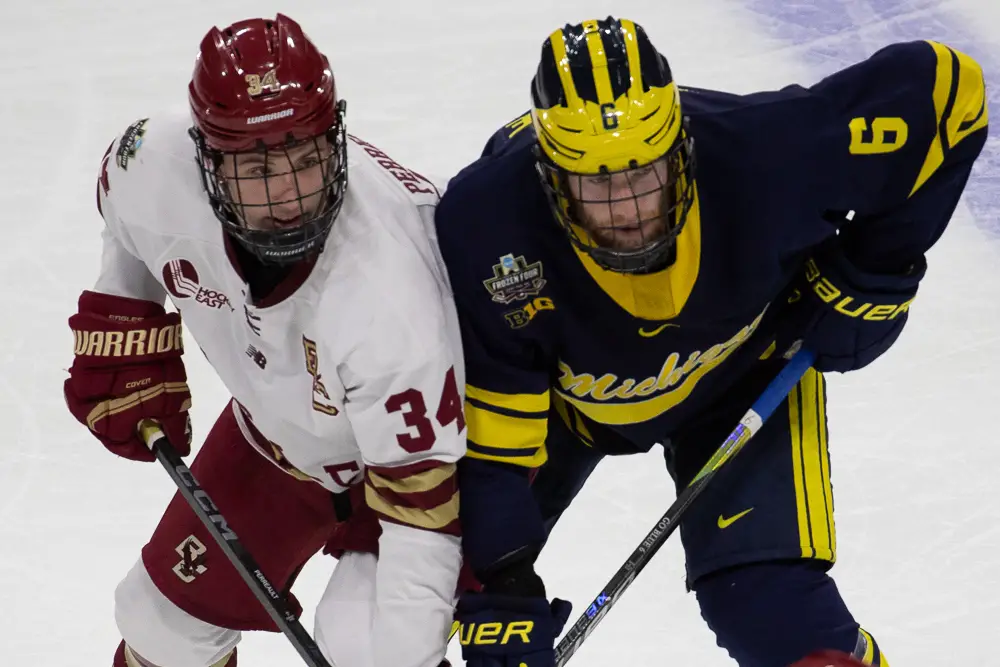
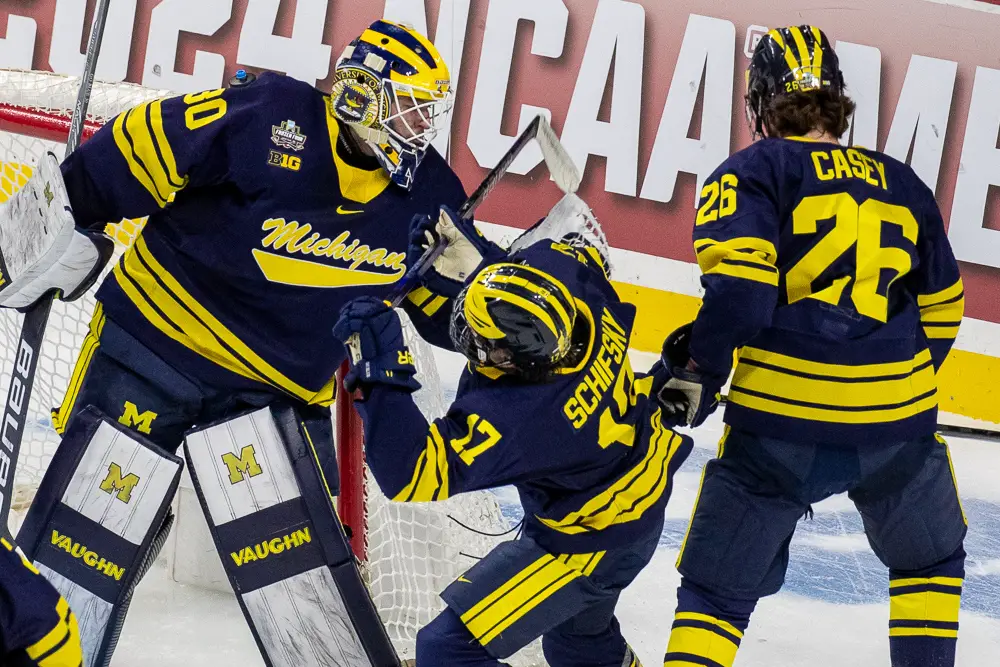
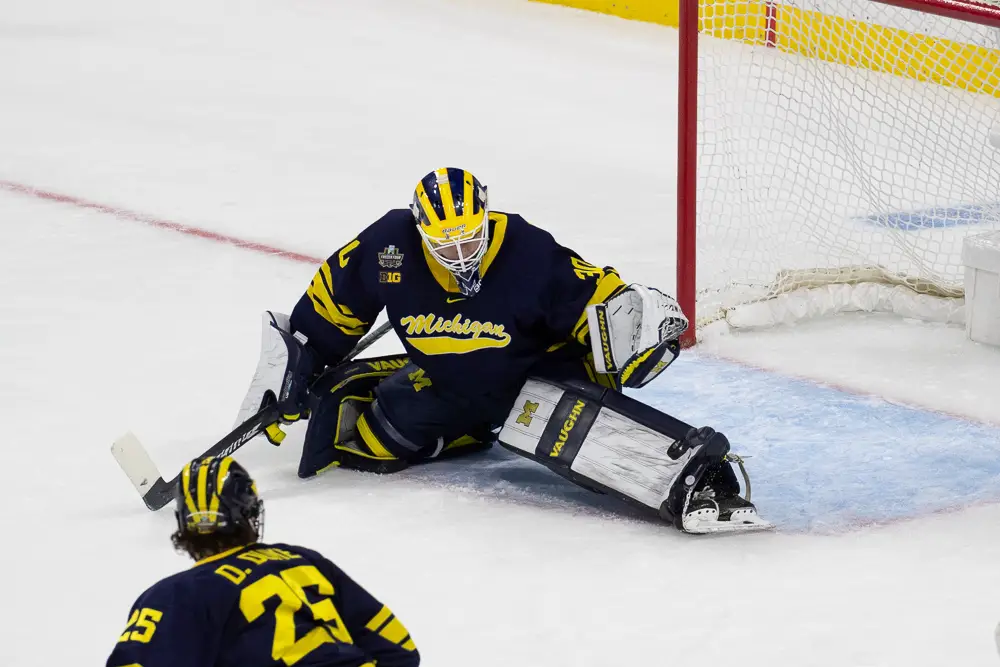
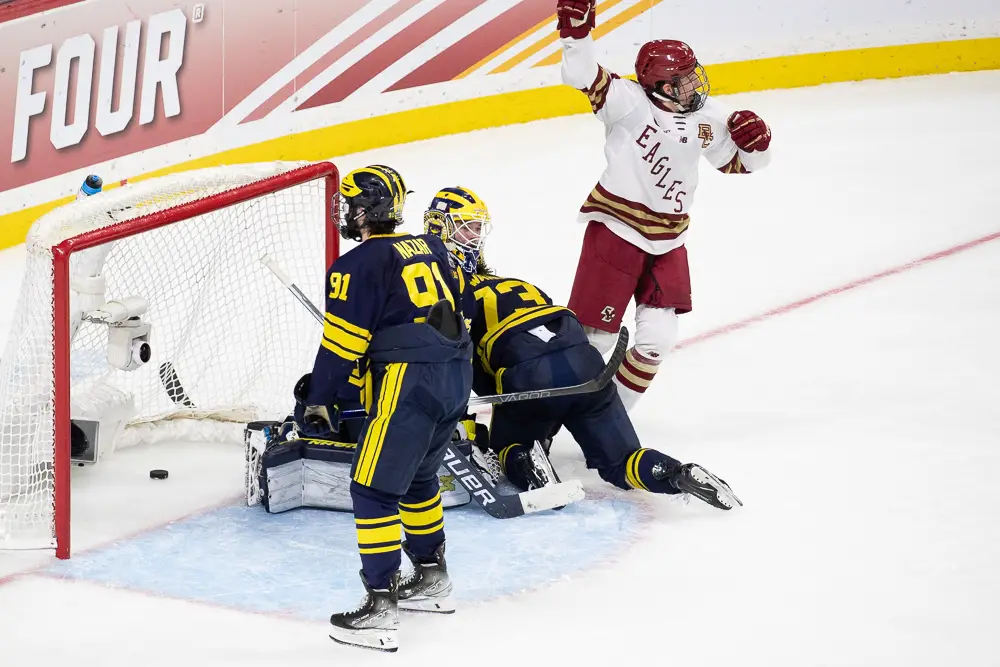
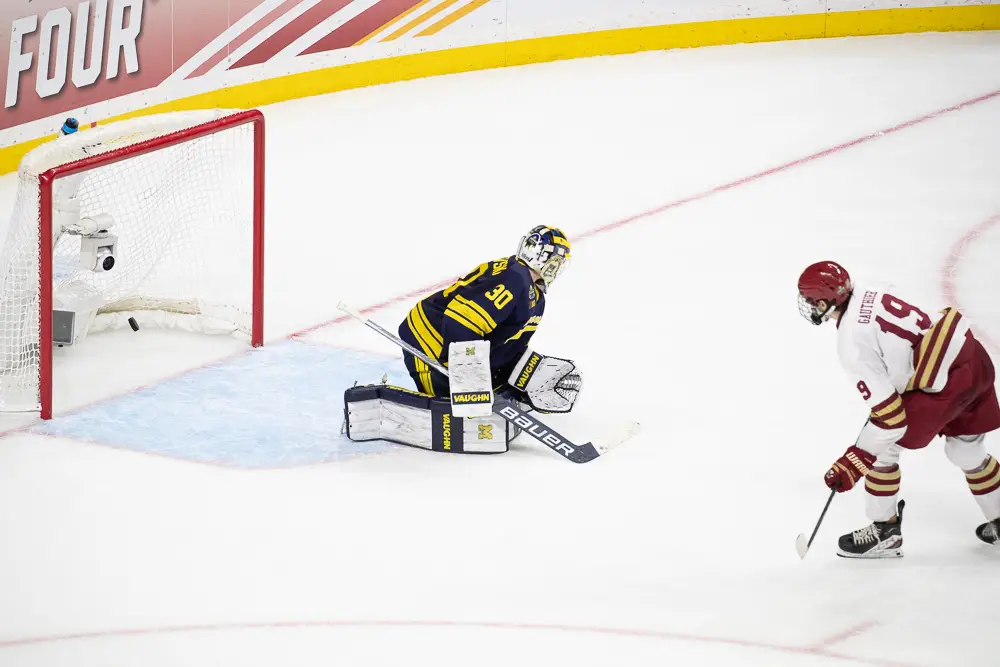
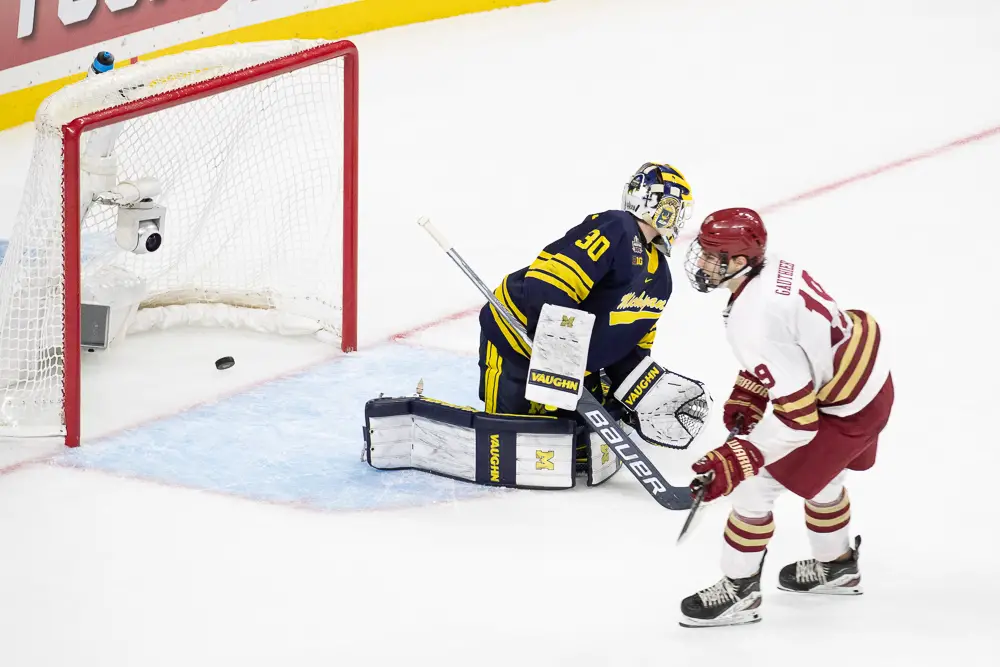
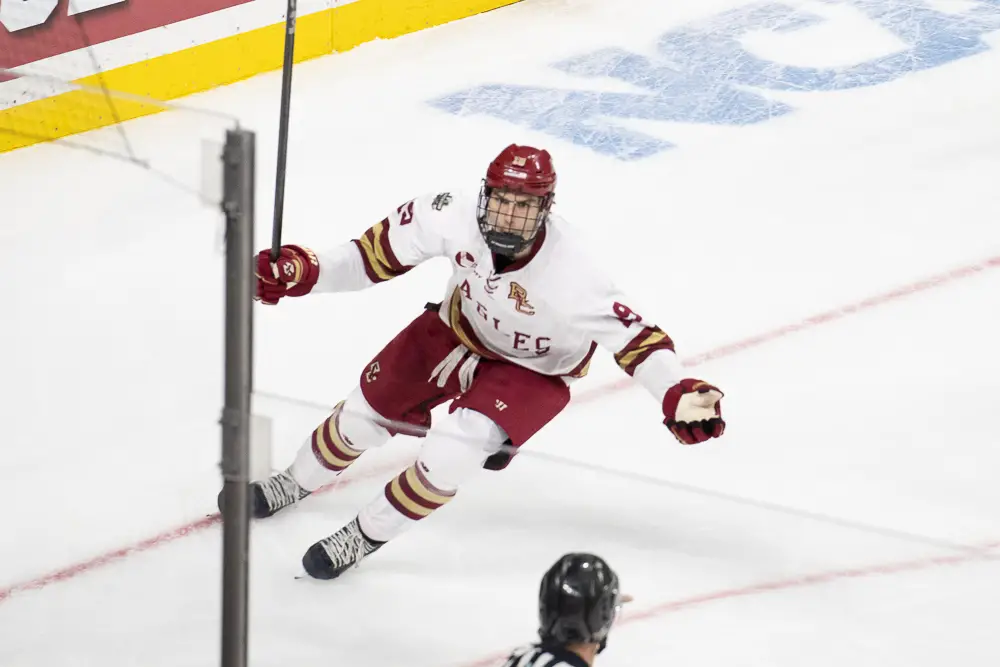
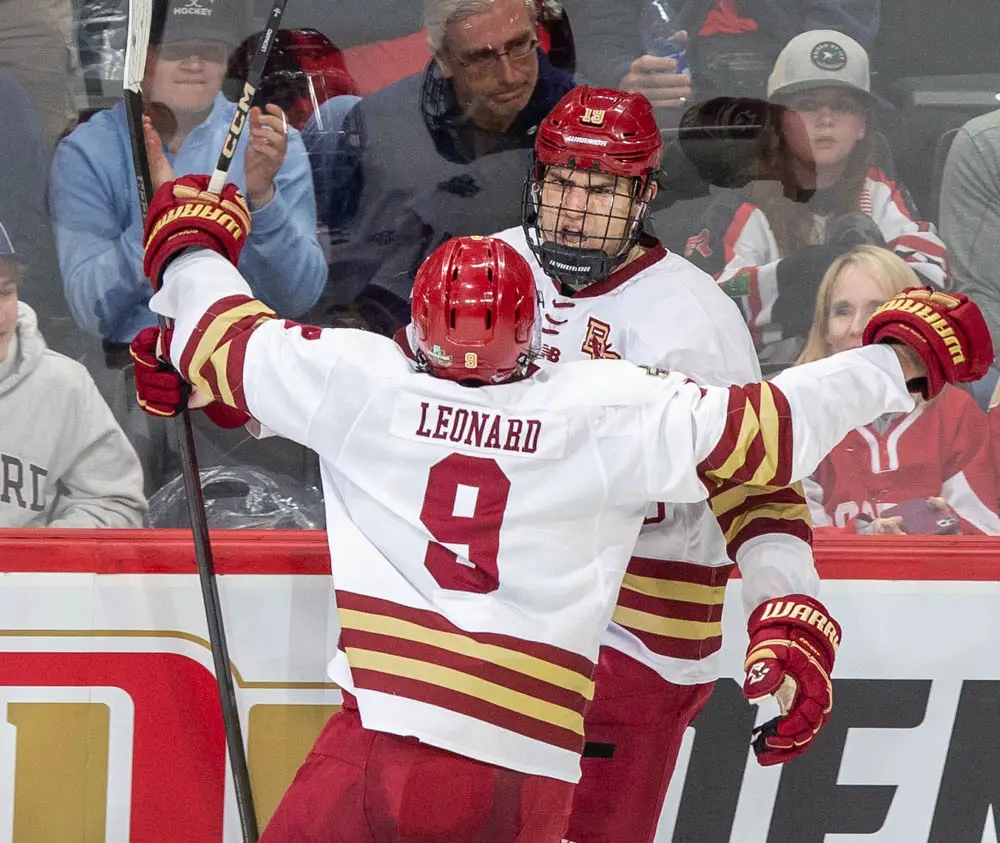
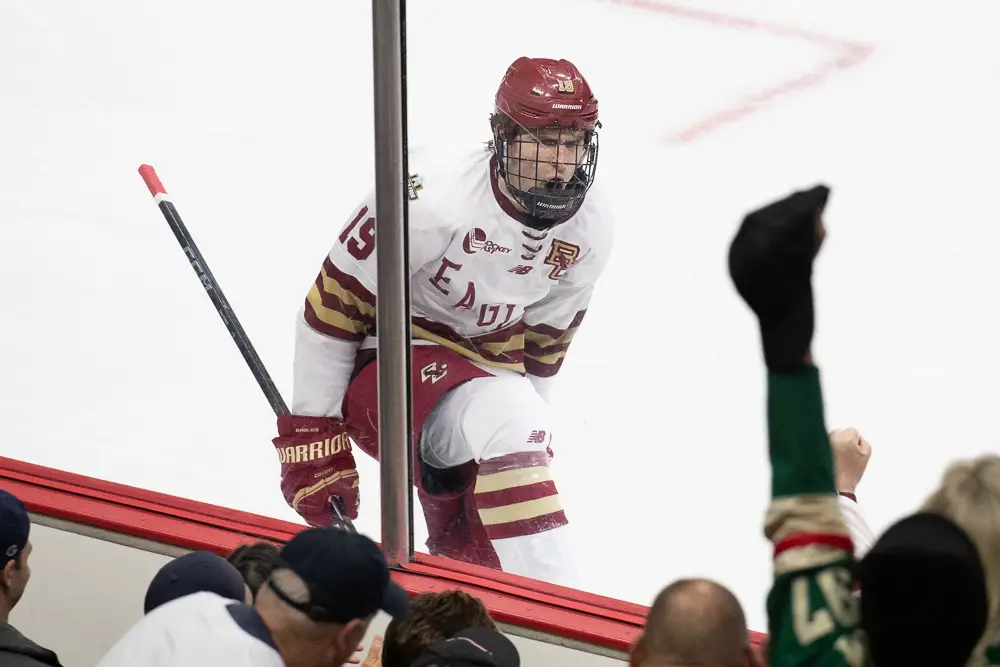
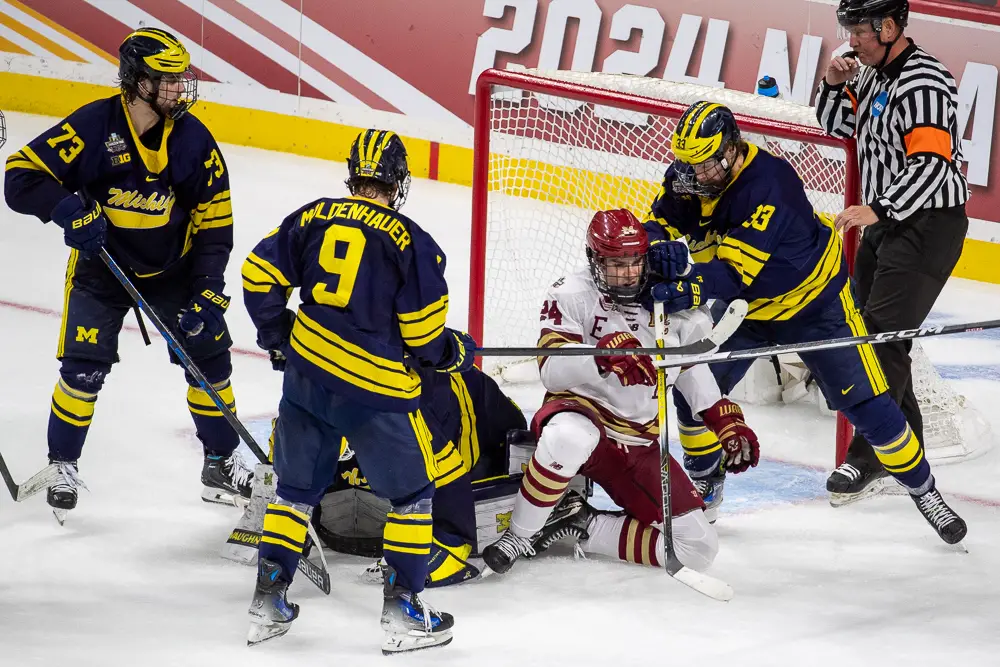
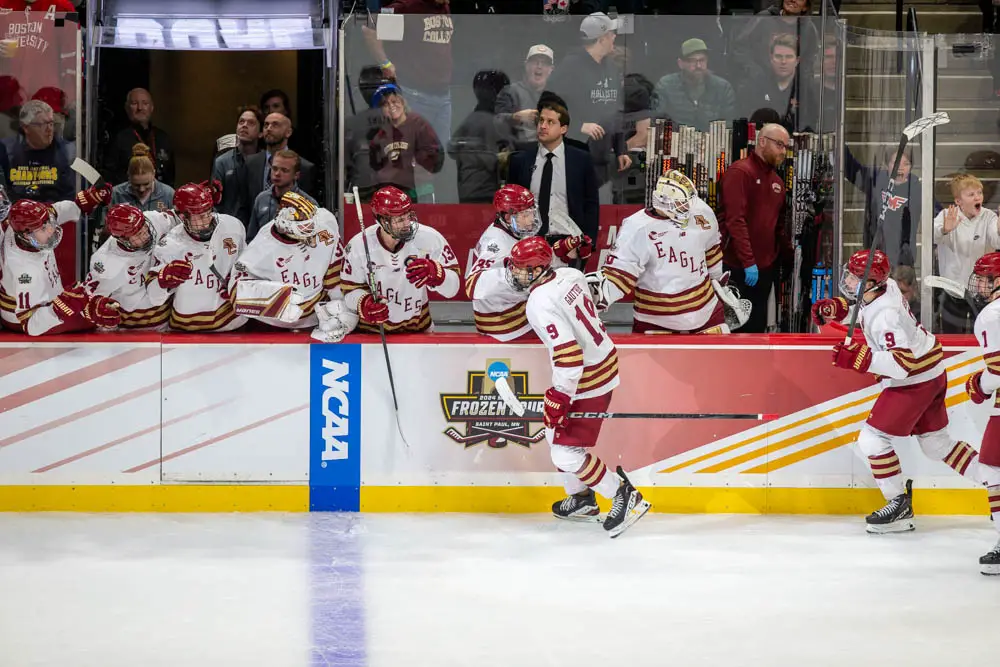
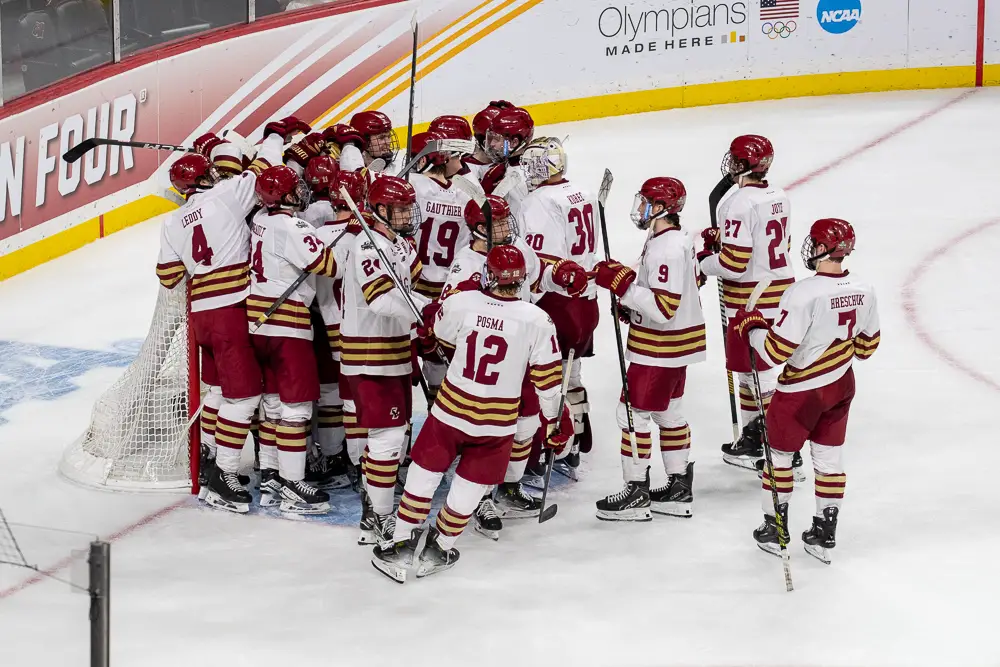
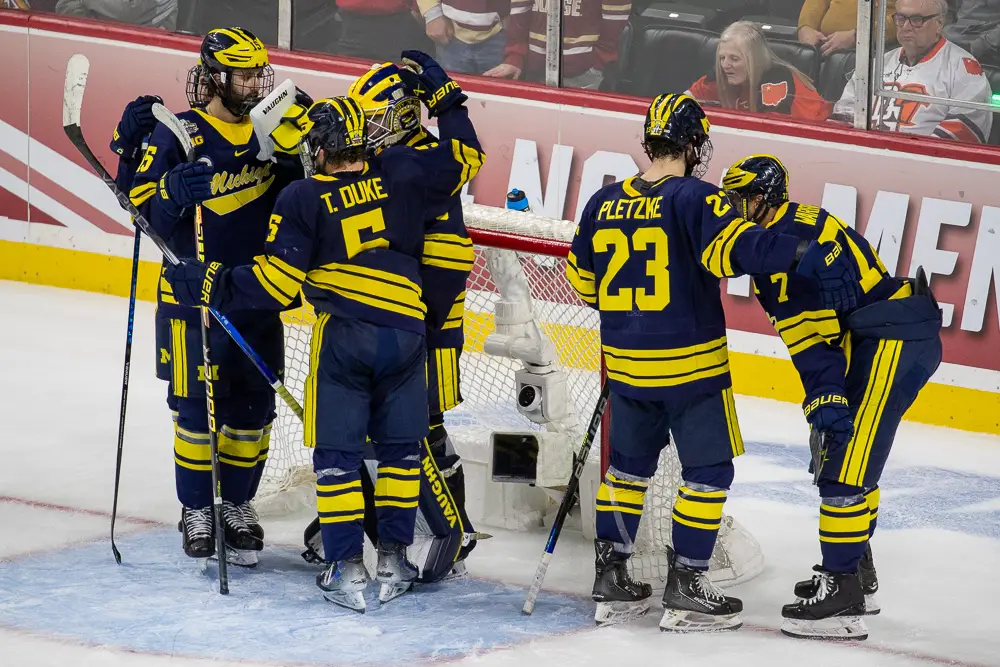

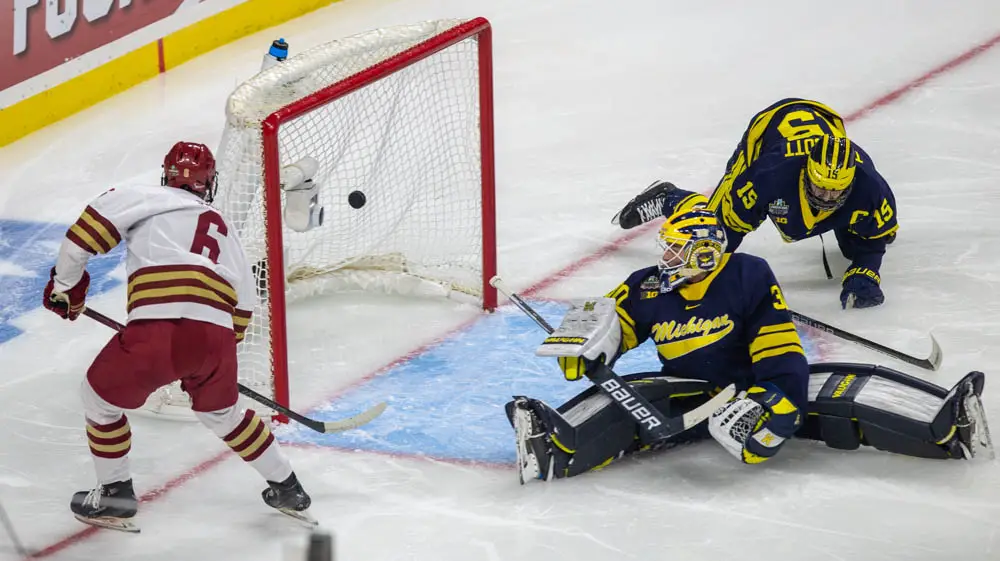
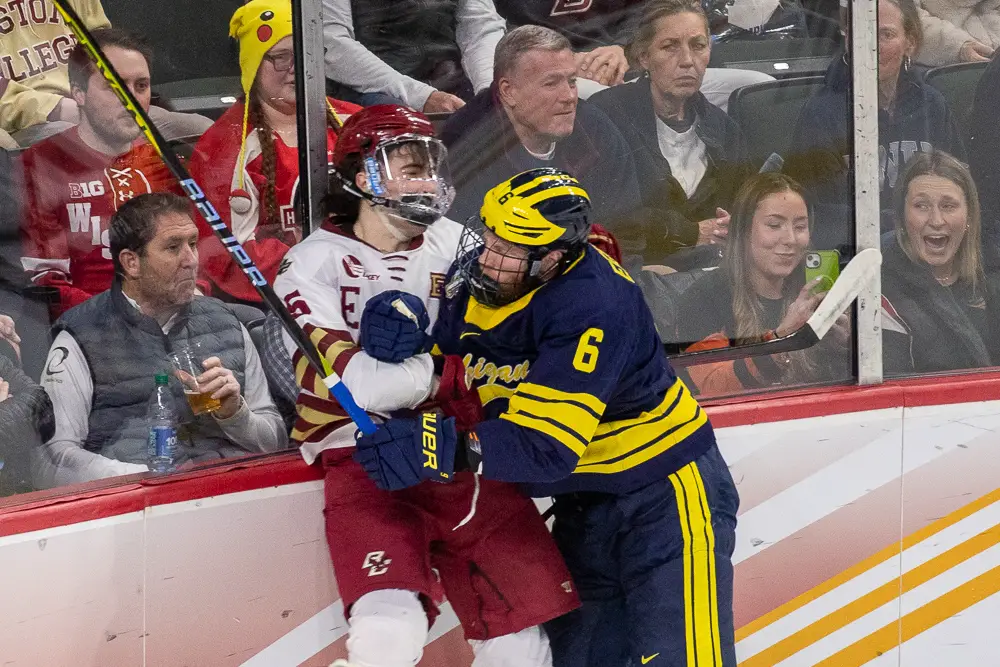
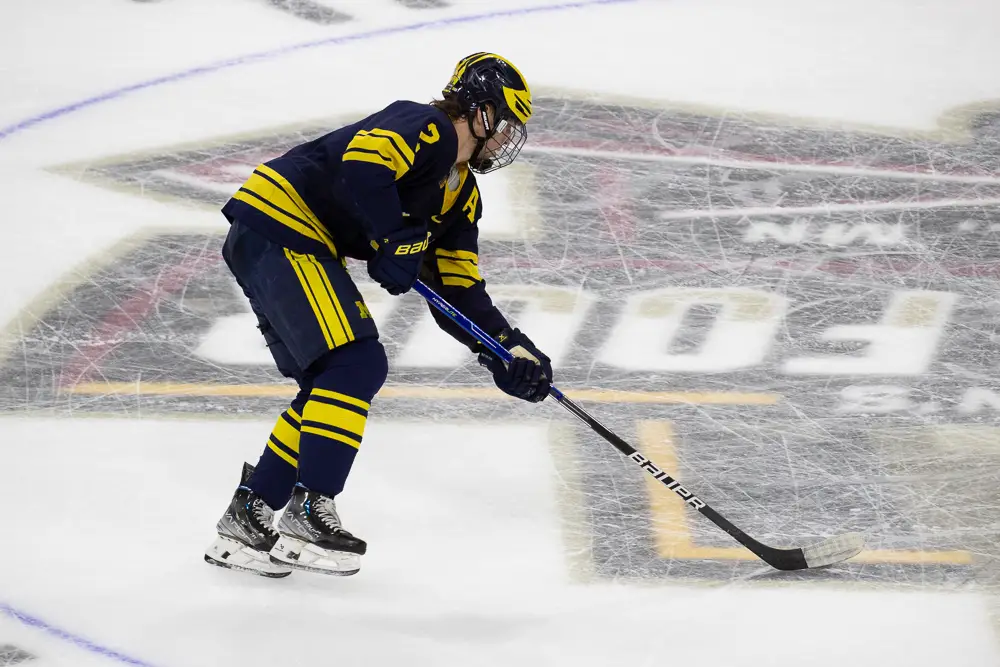
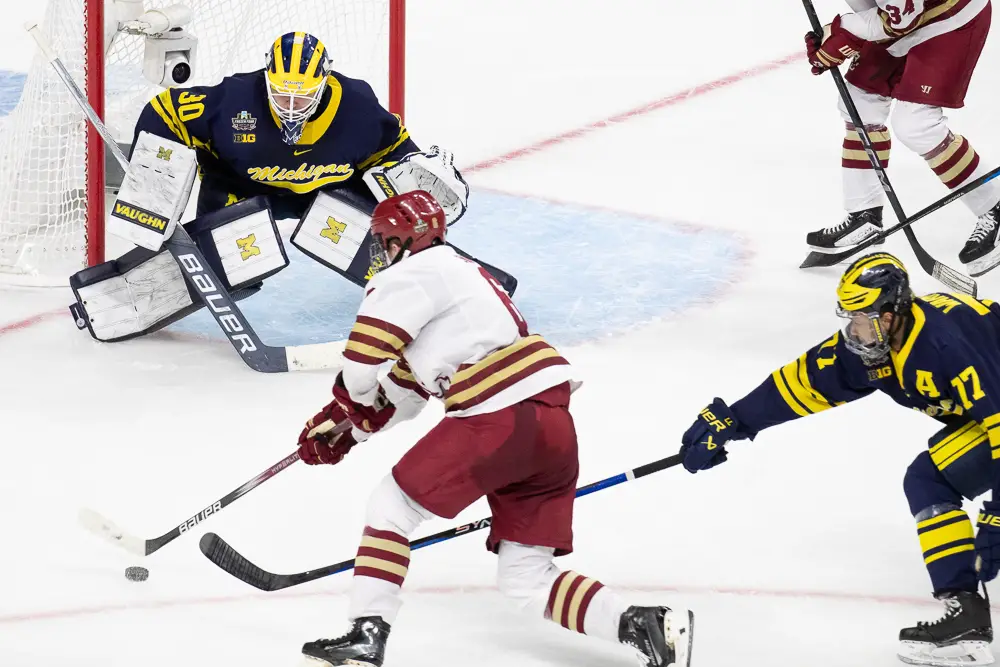
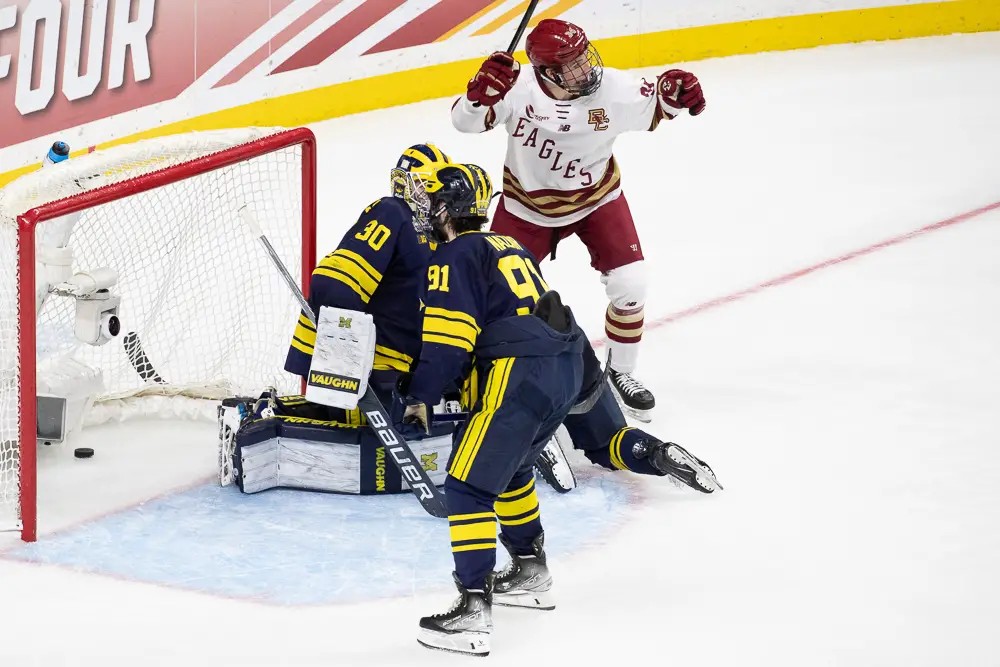
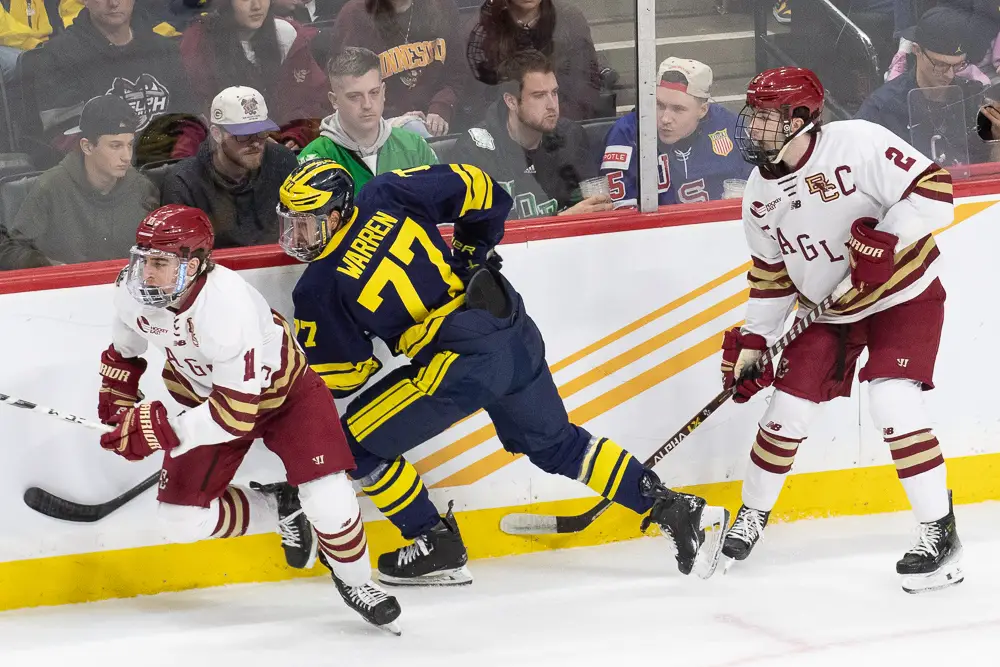
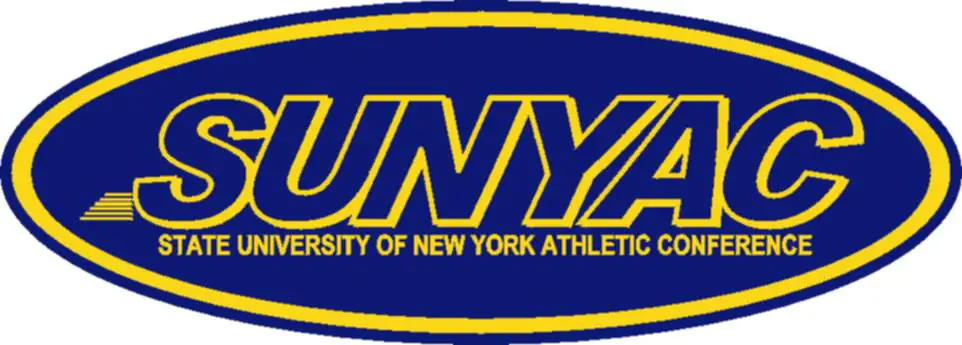 The SUNYAC will add Hobart and William Smith in the sports of men’s and women’s hockey, and Skidmore in men’s hockey, beginning with the 2025-26 season.
The SUNYAC will add Hobart and William Smith in the sports of men’s and women’s hockey, and Skidmore in men’s hockey, beginning with the 2025-26 season.